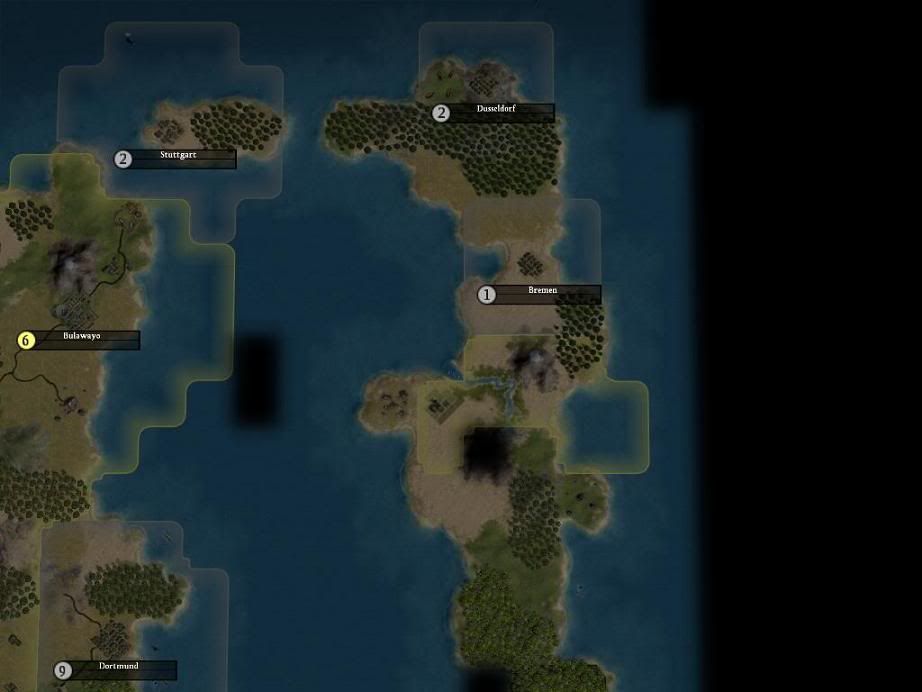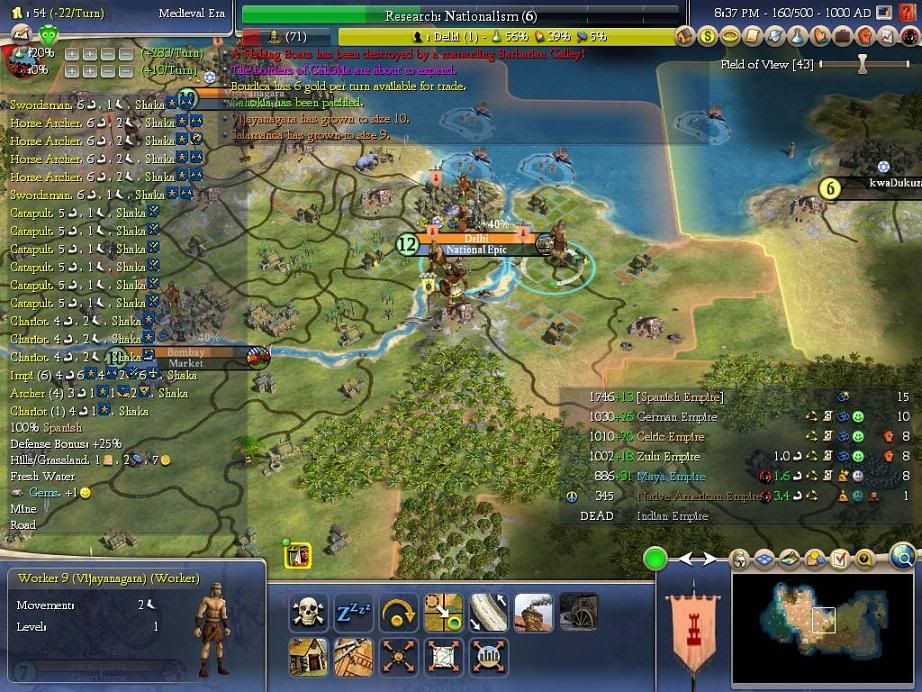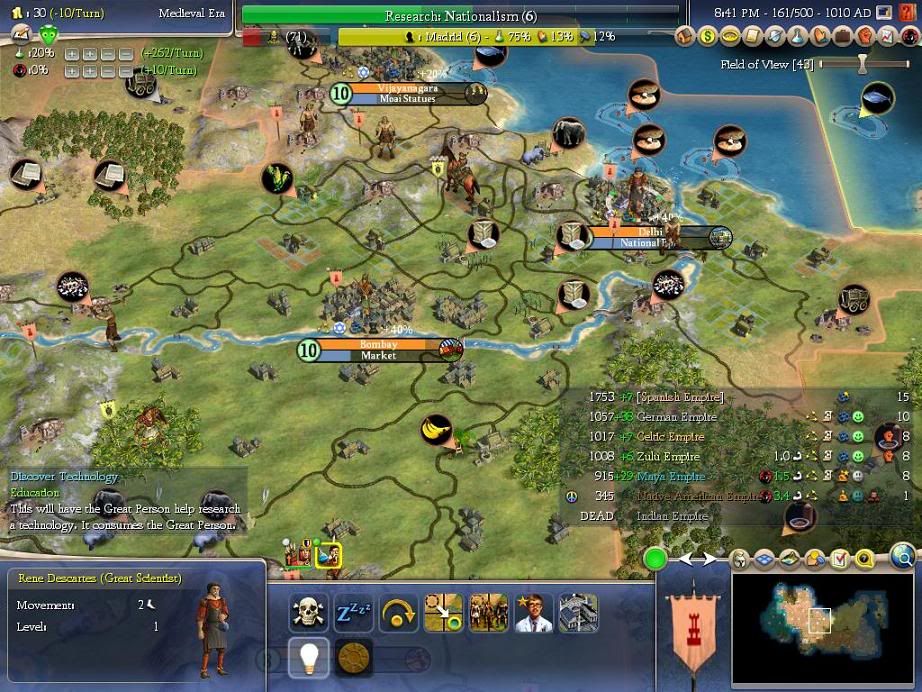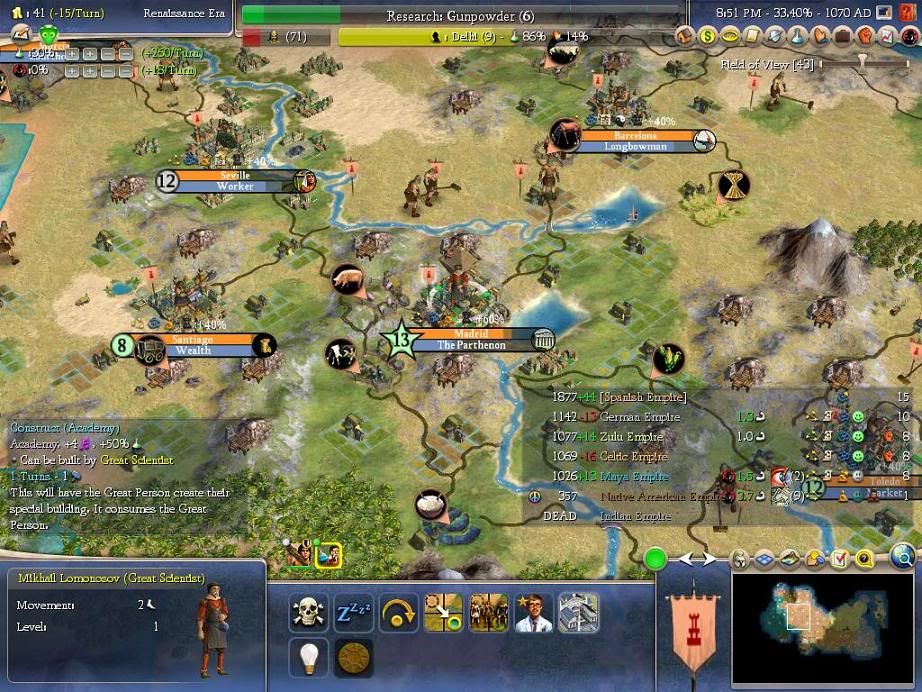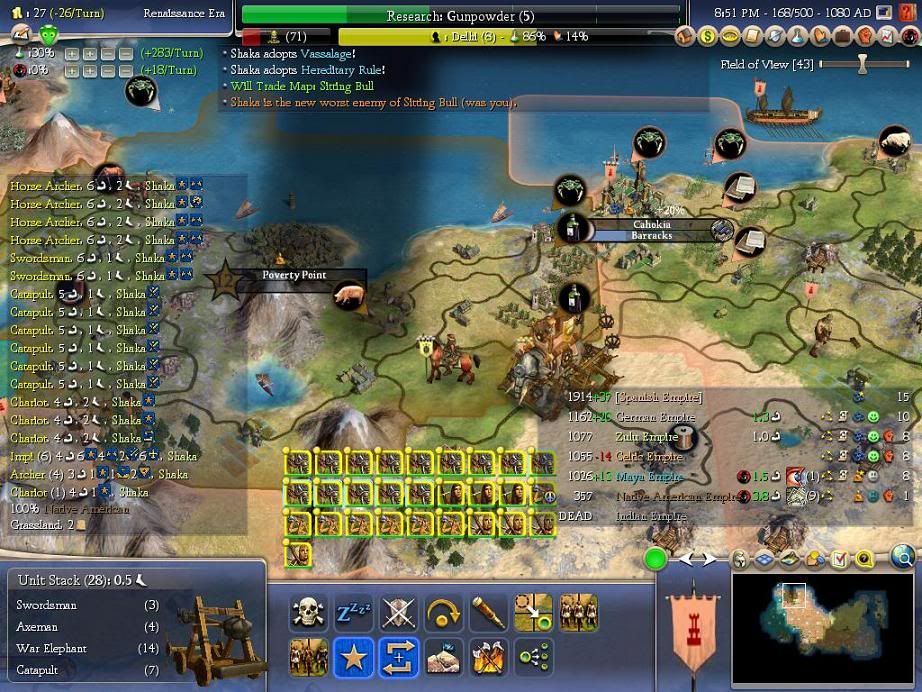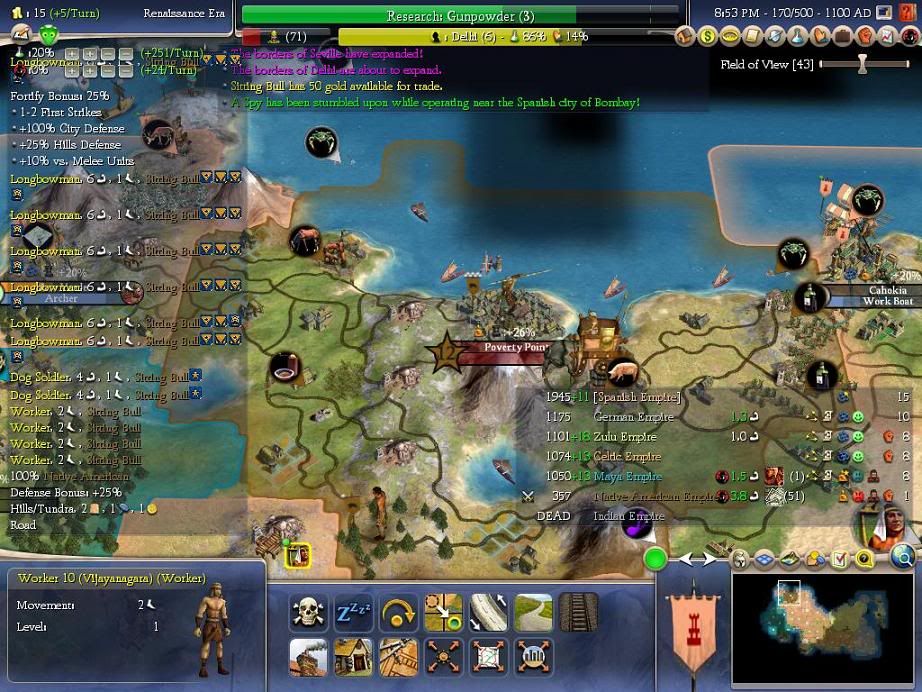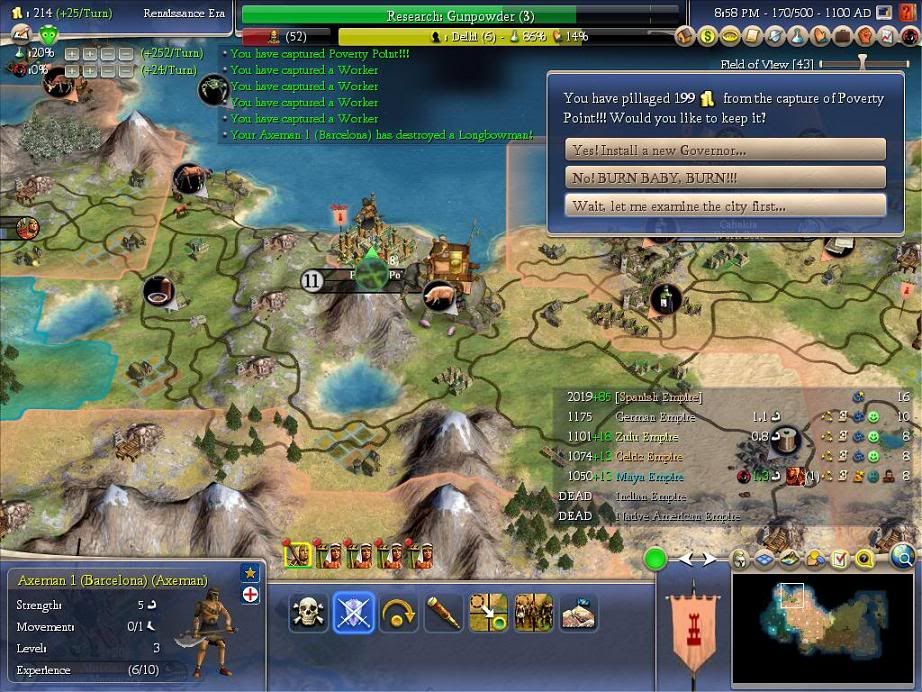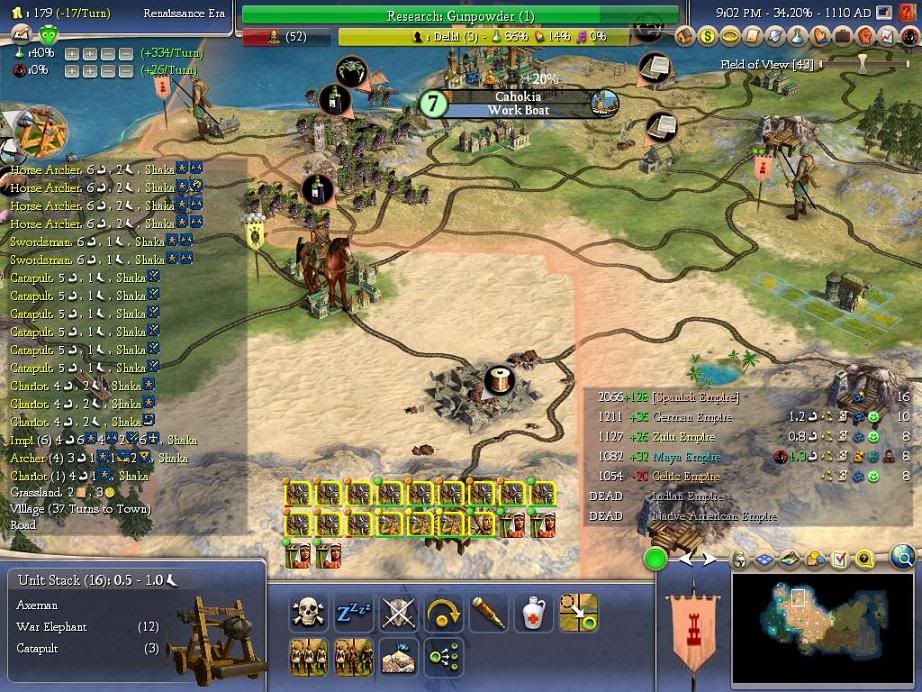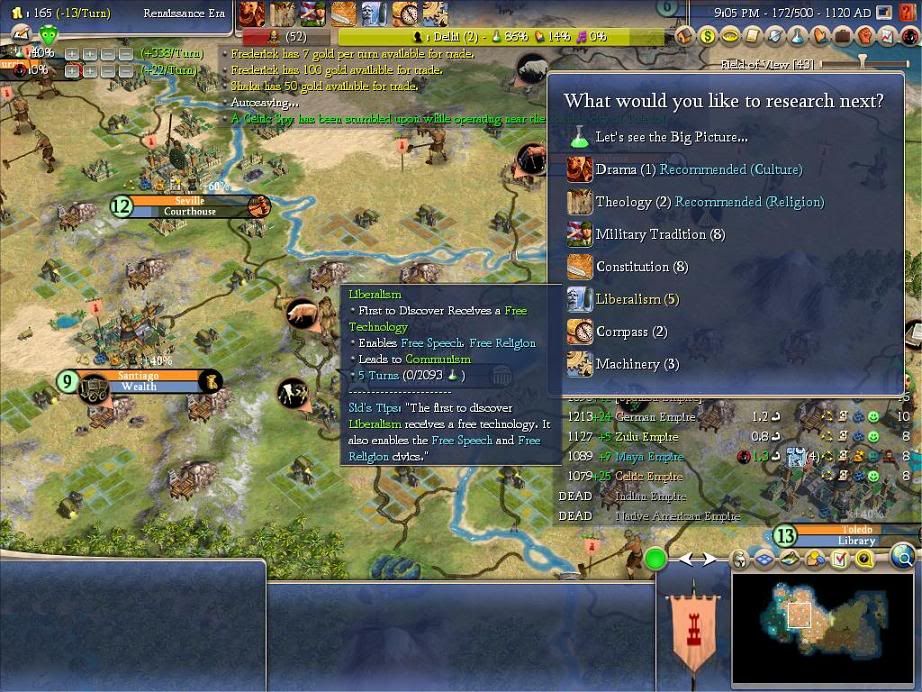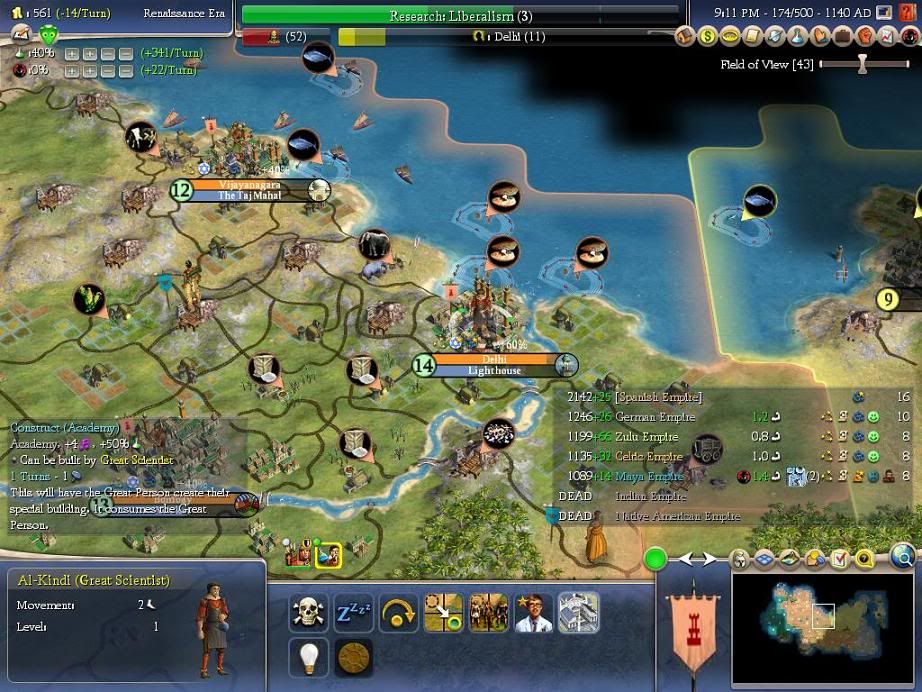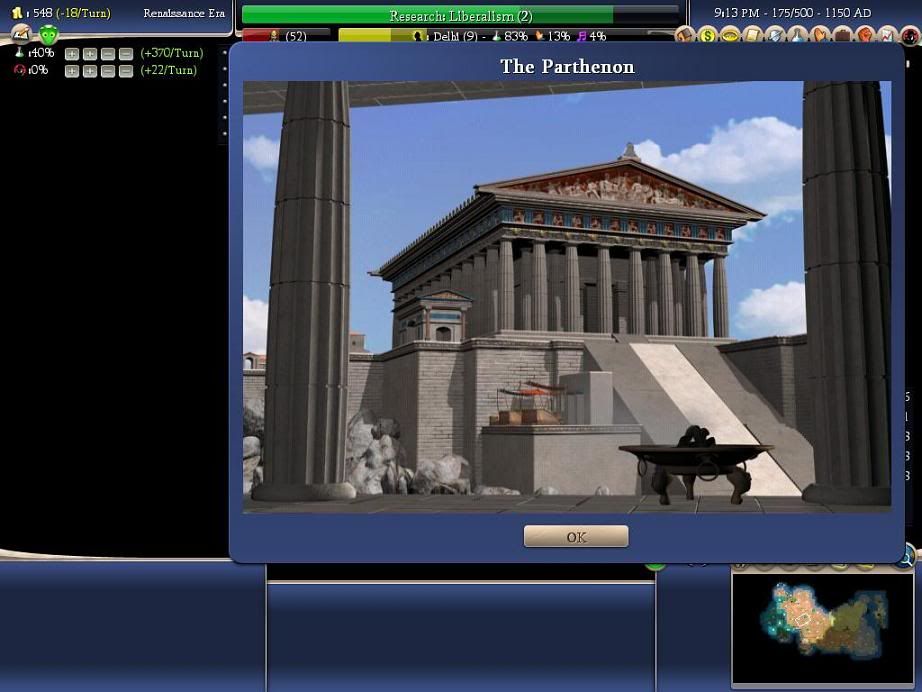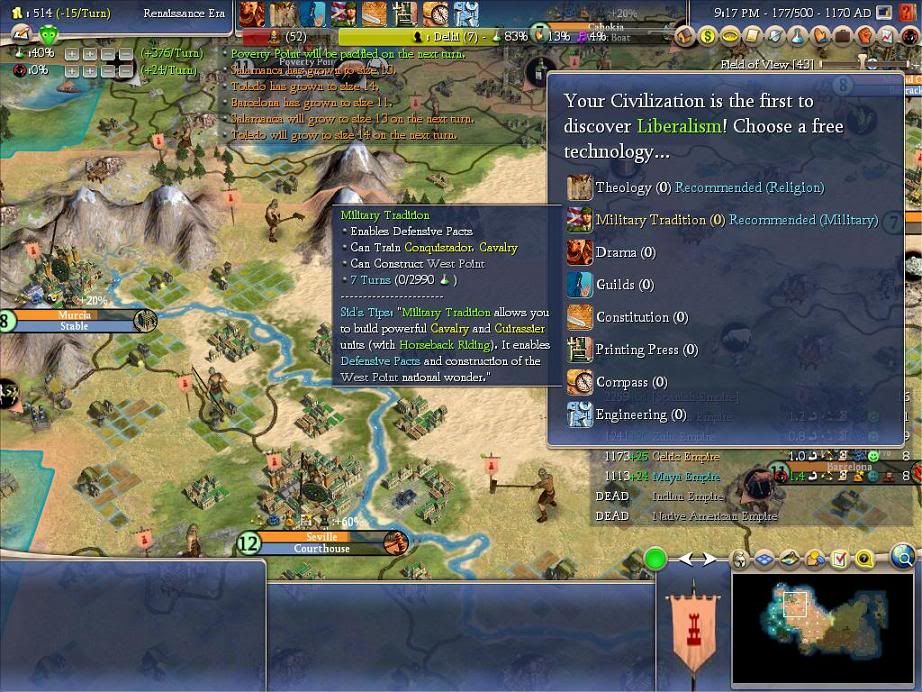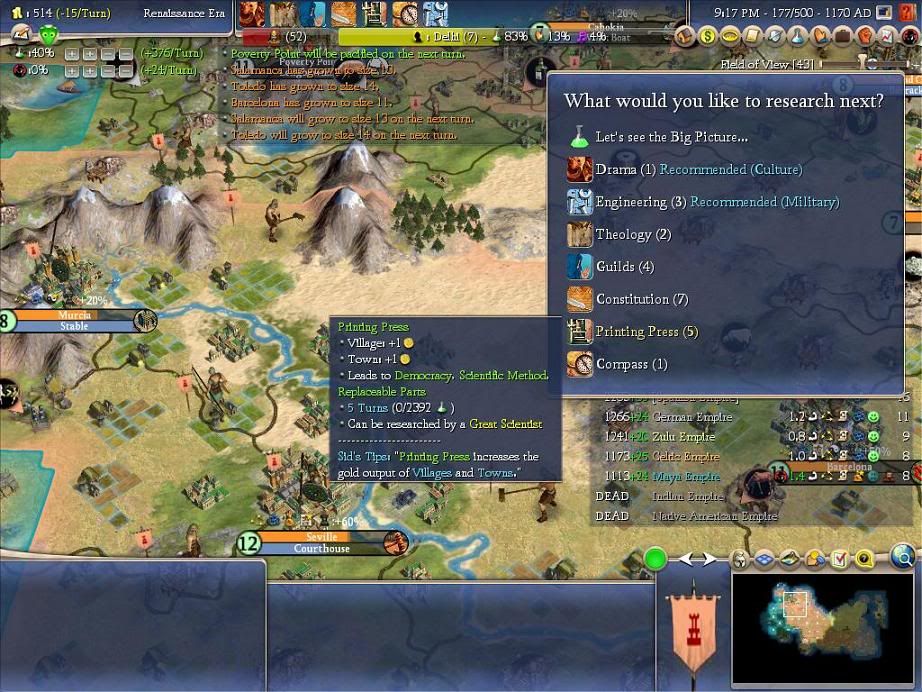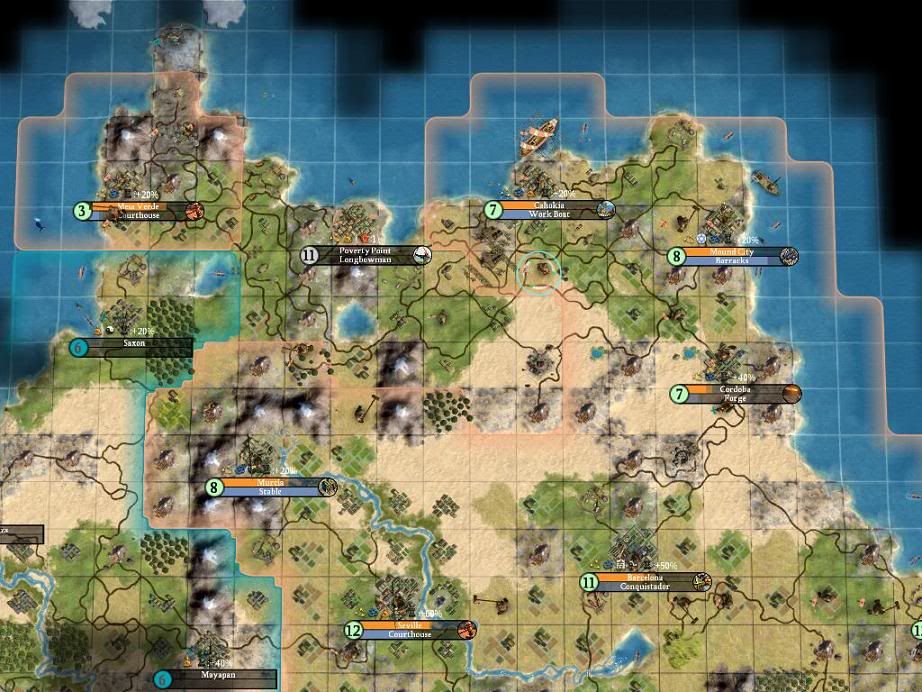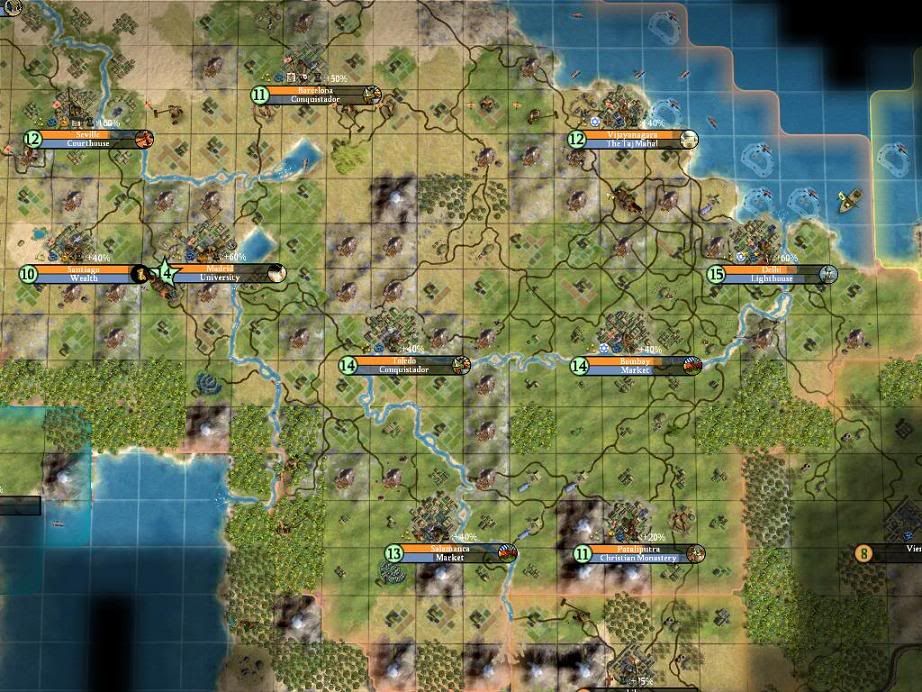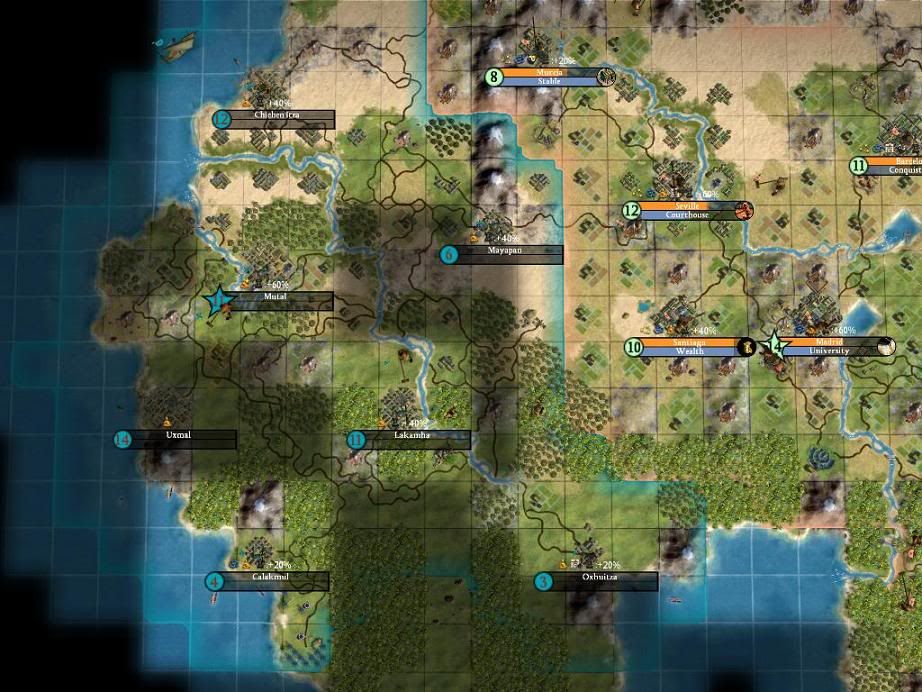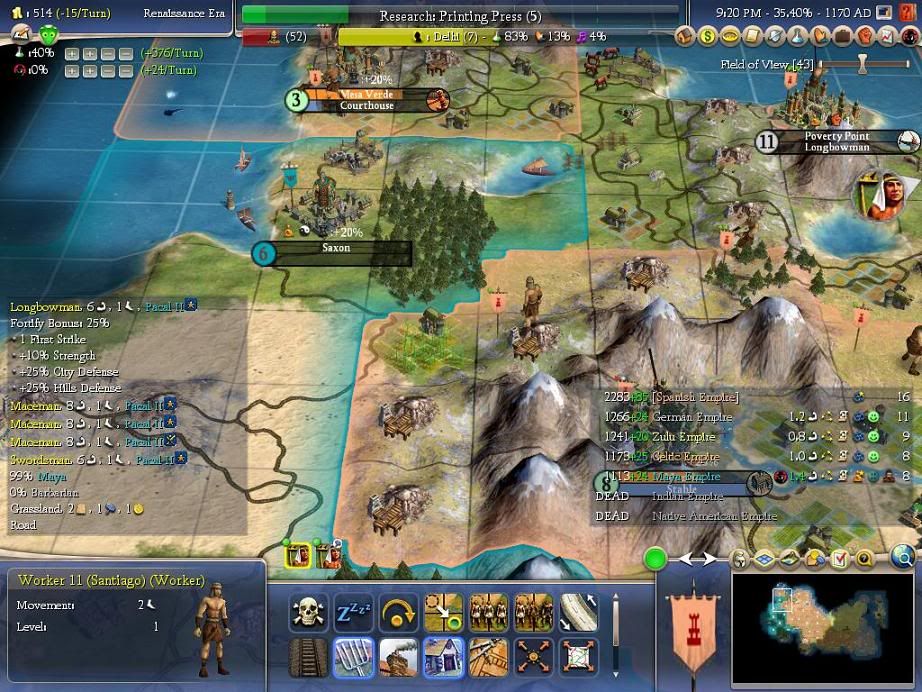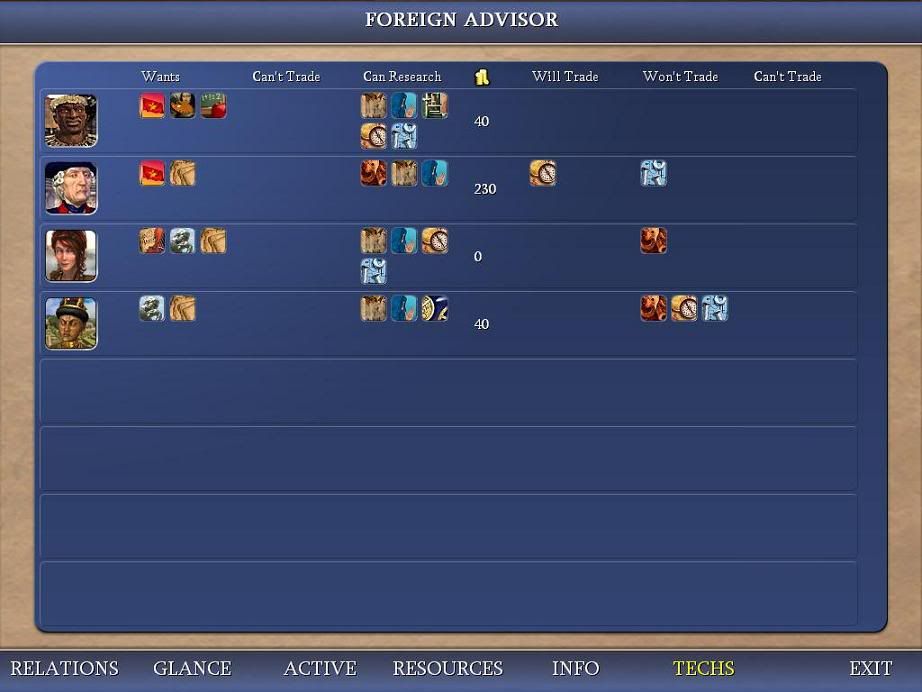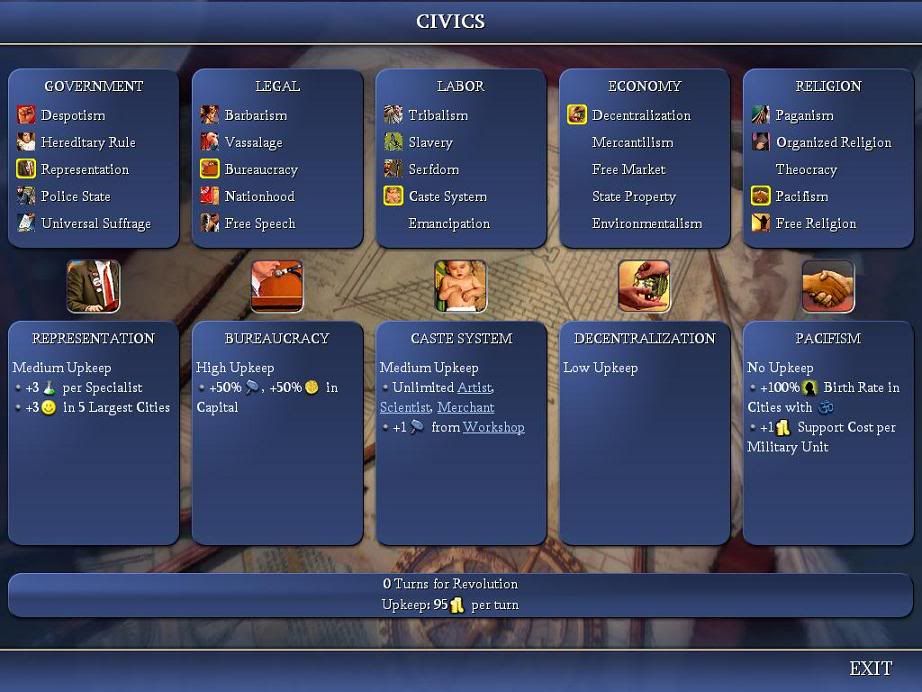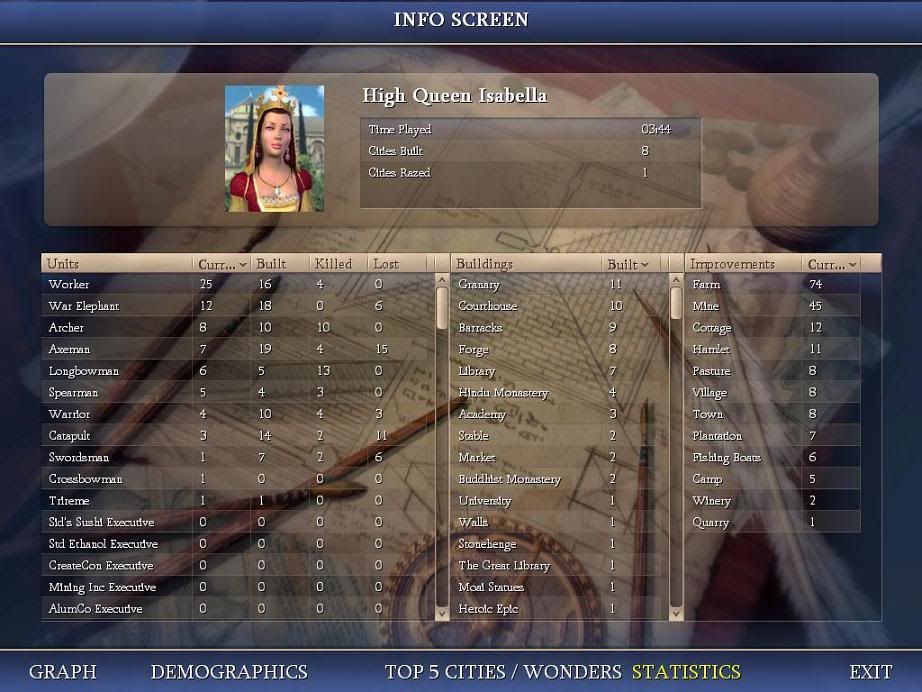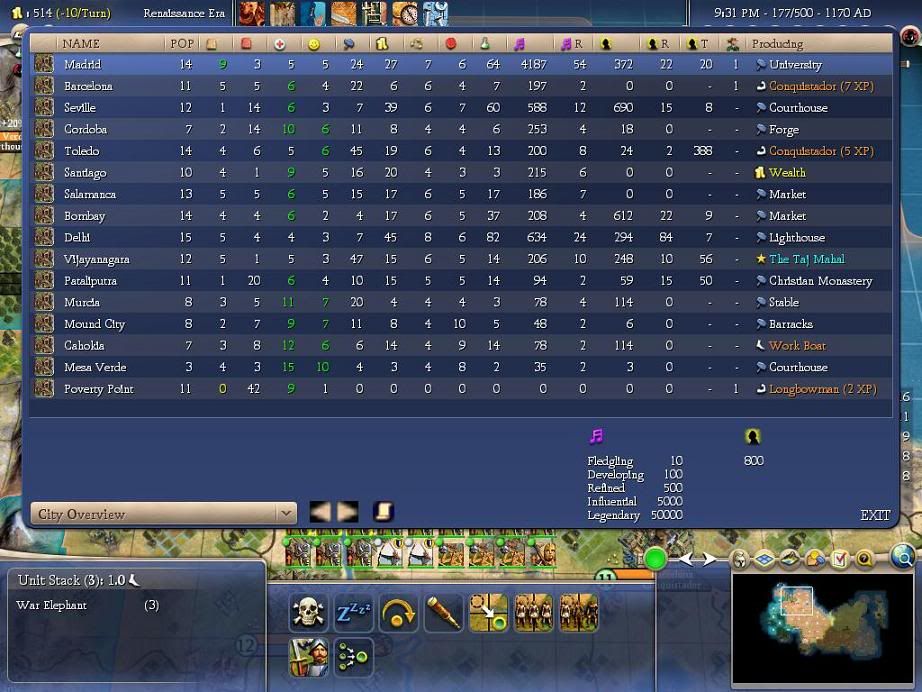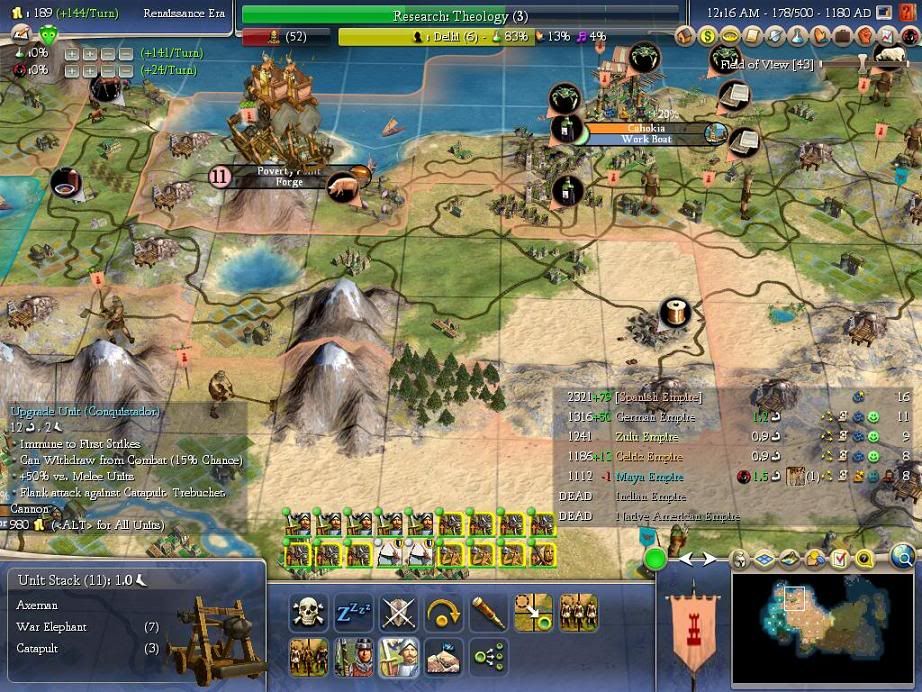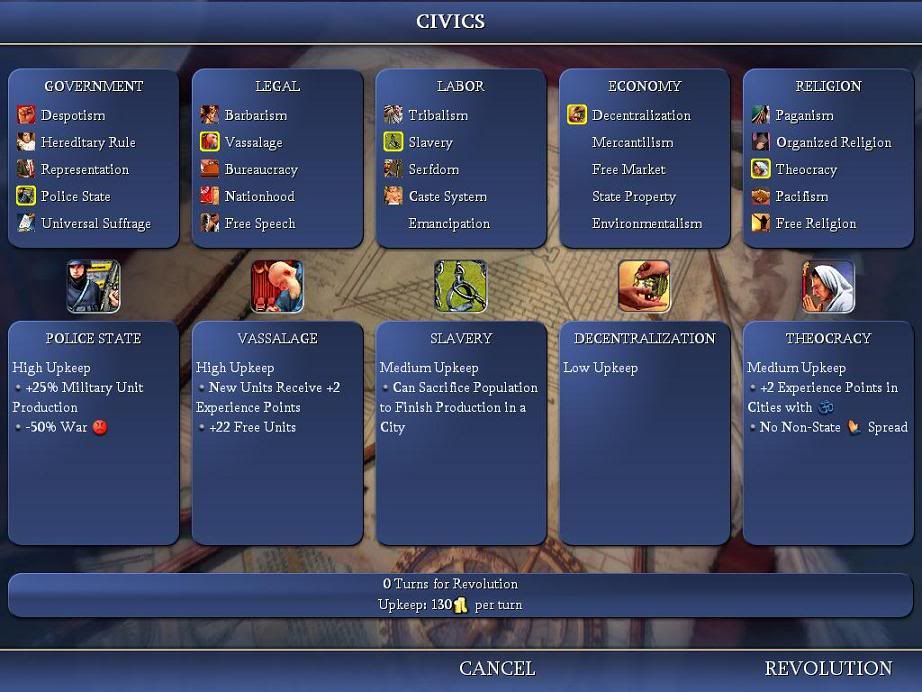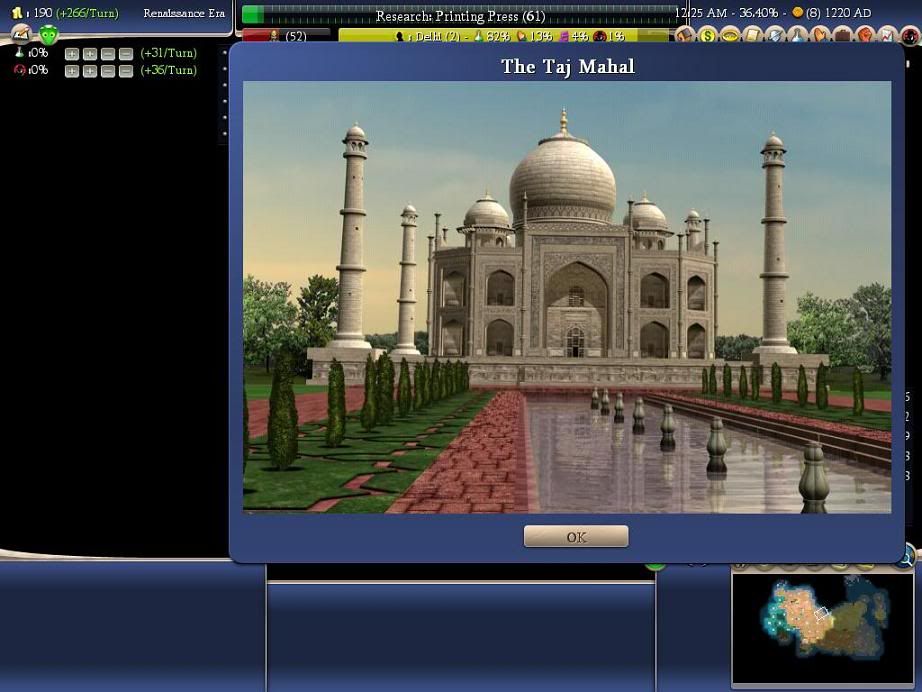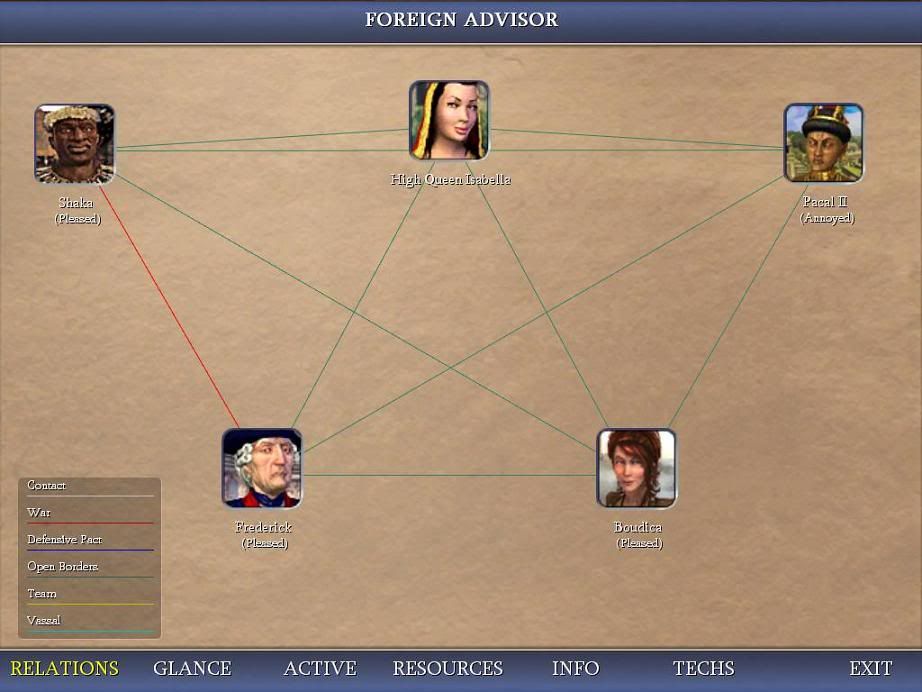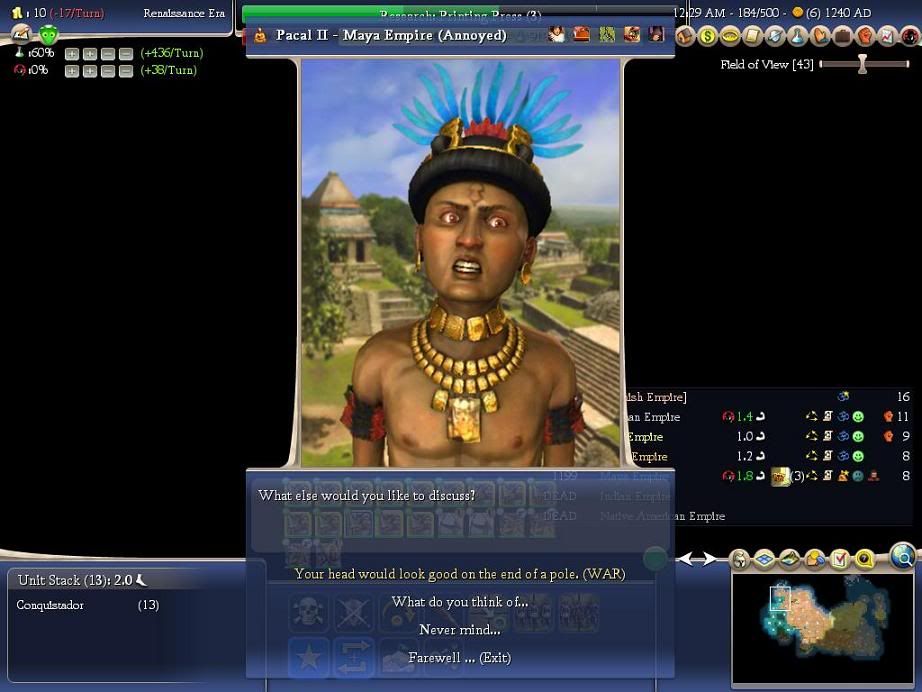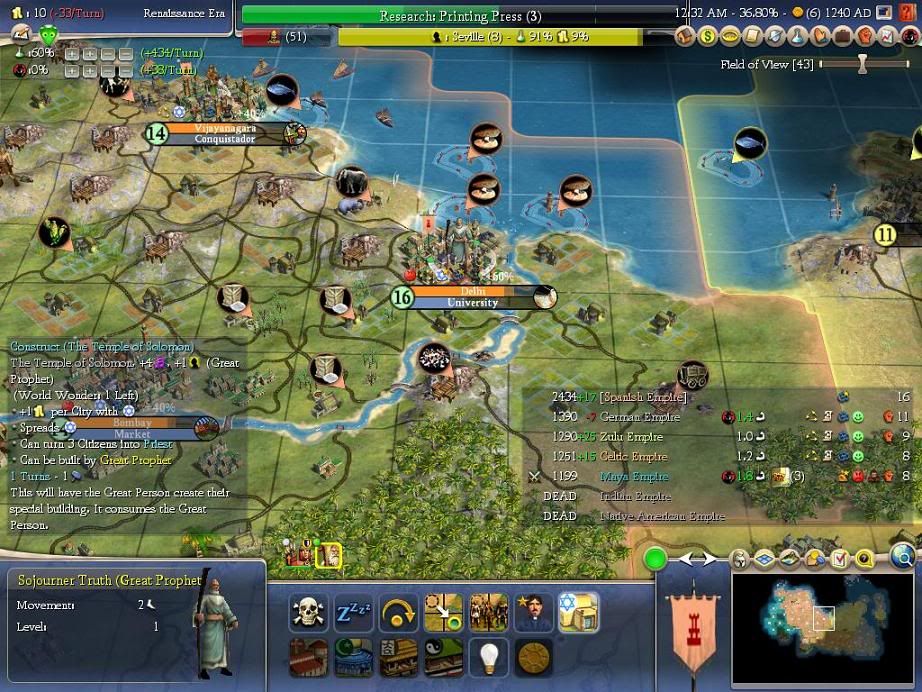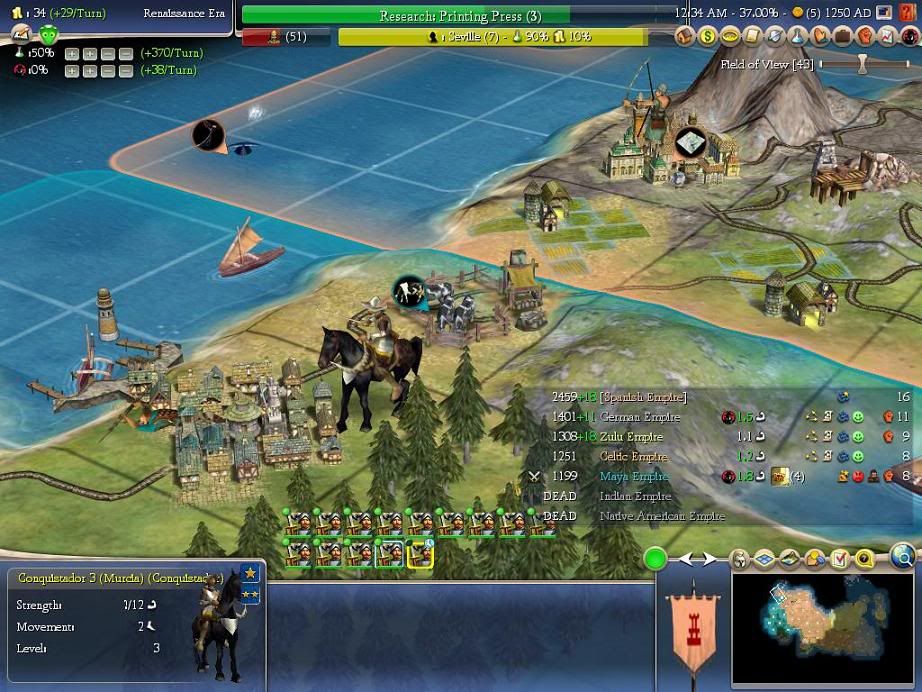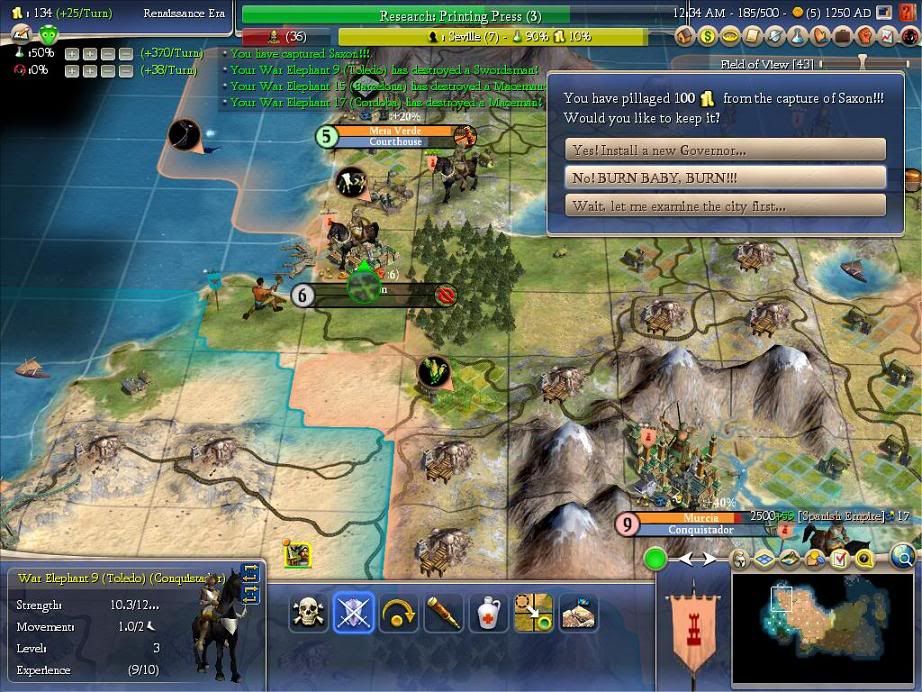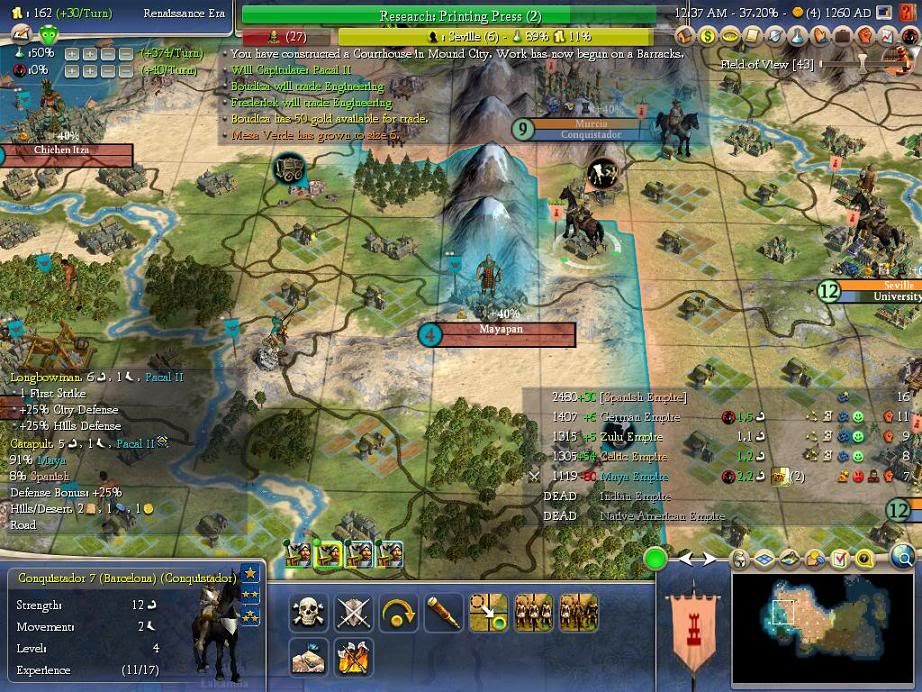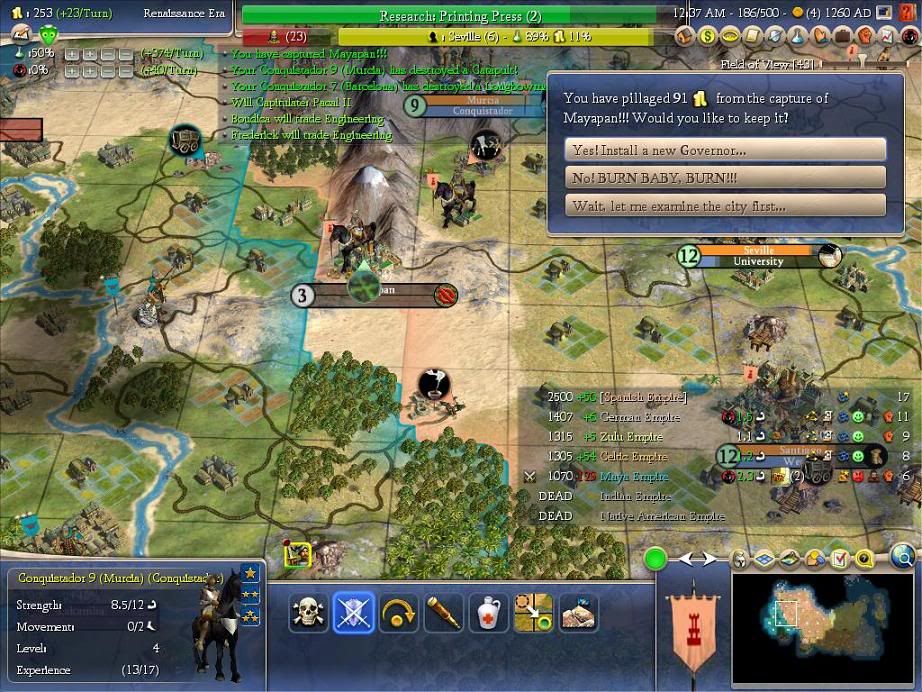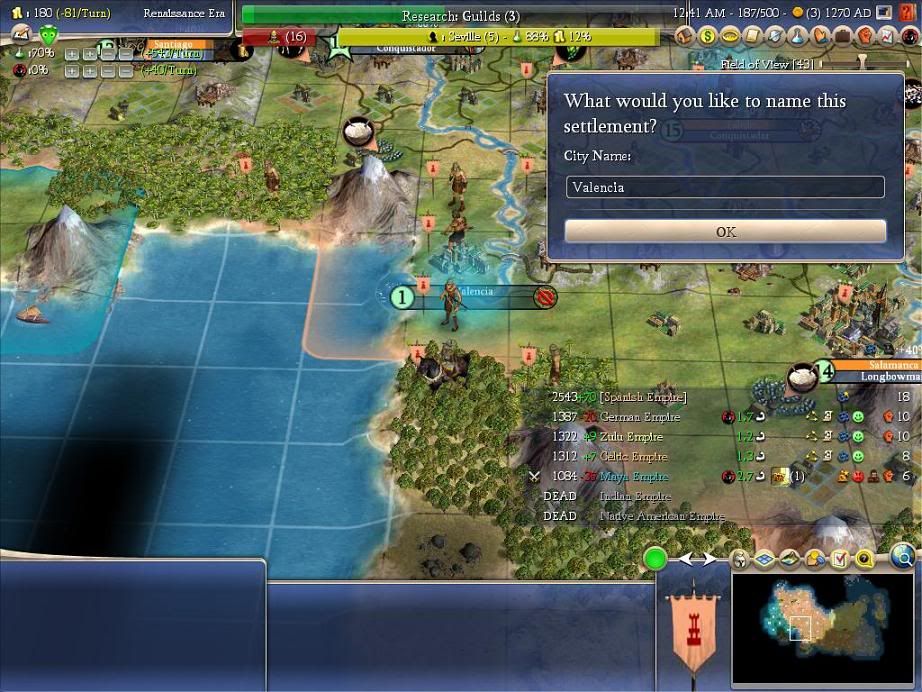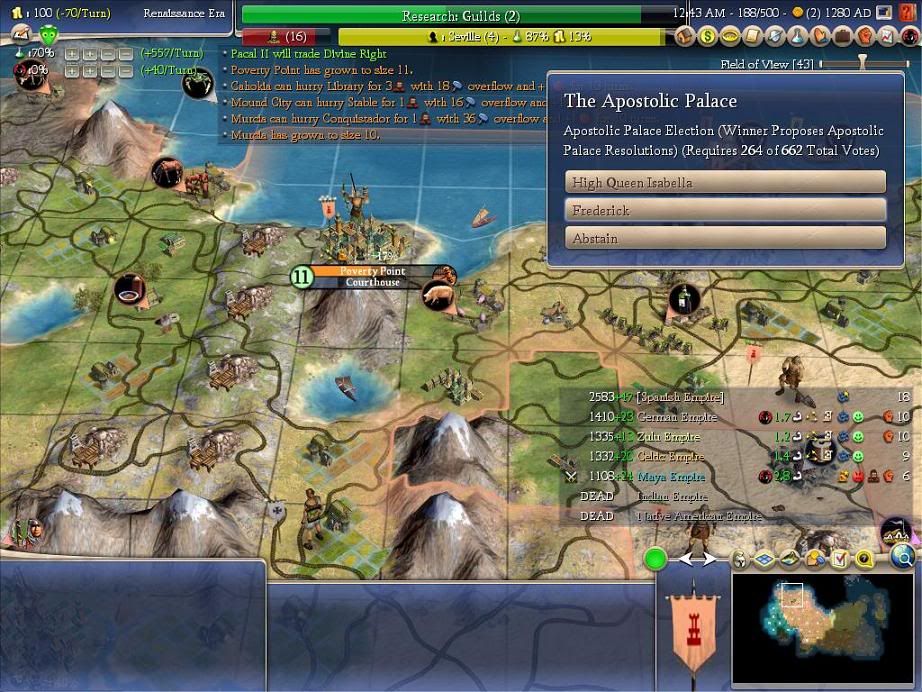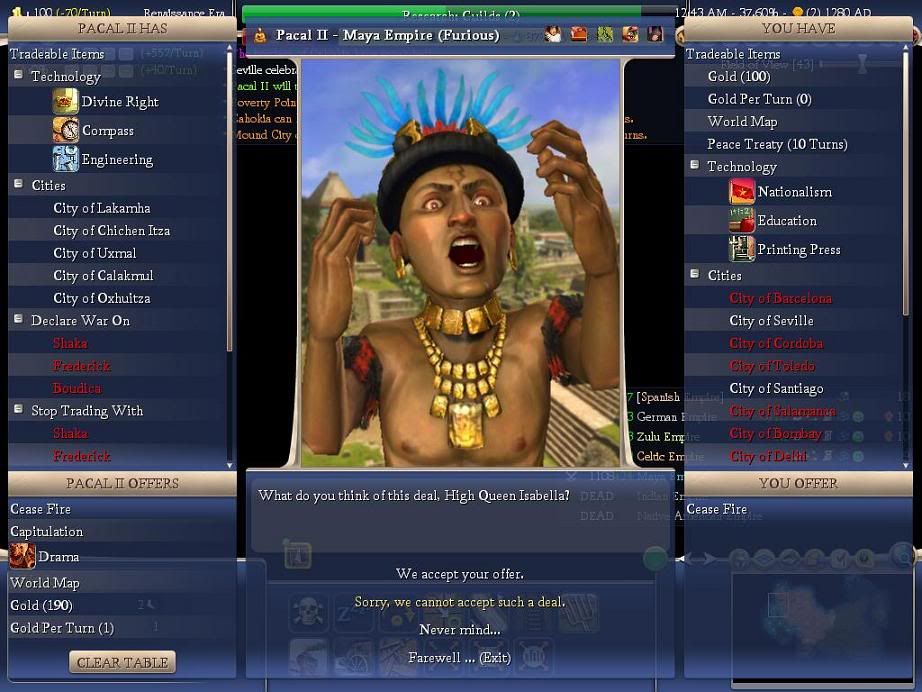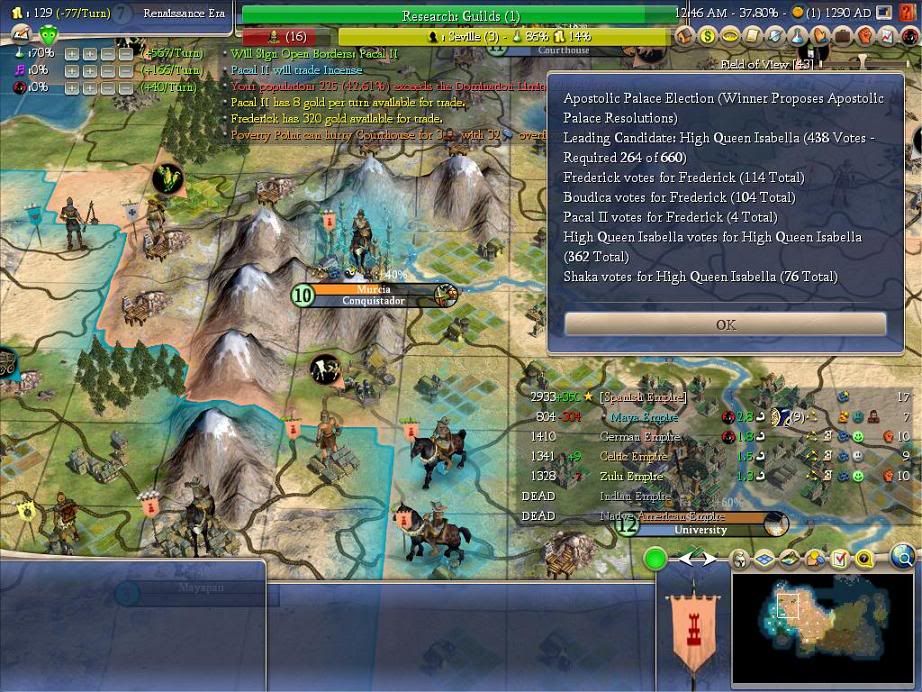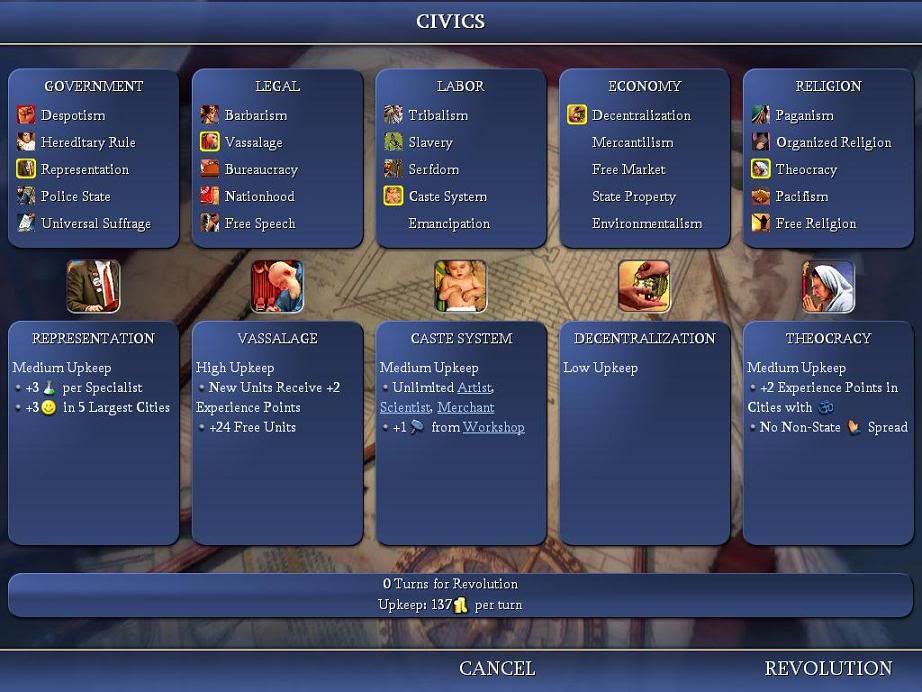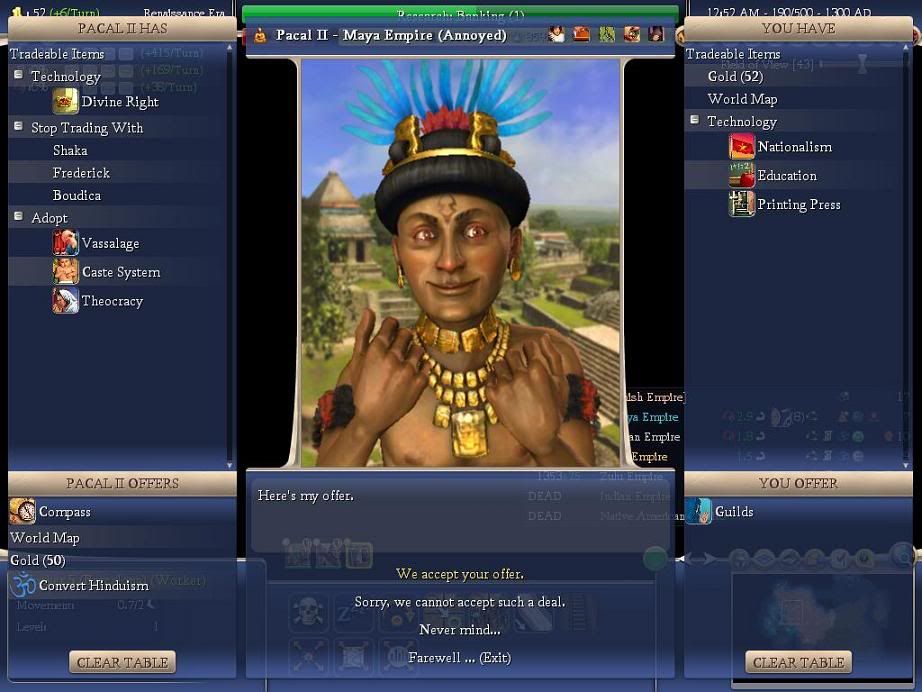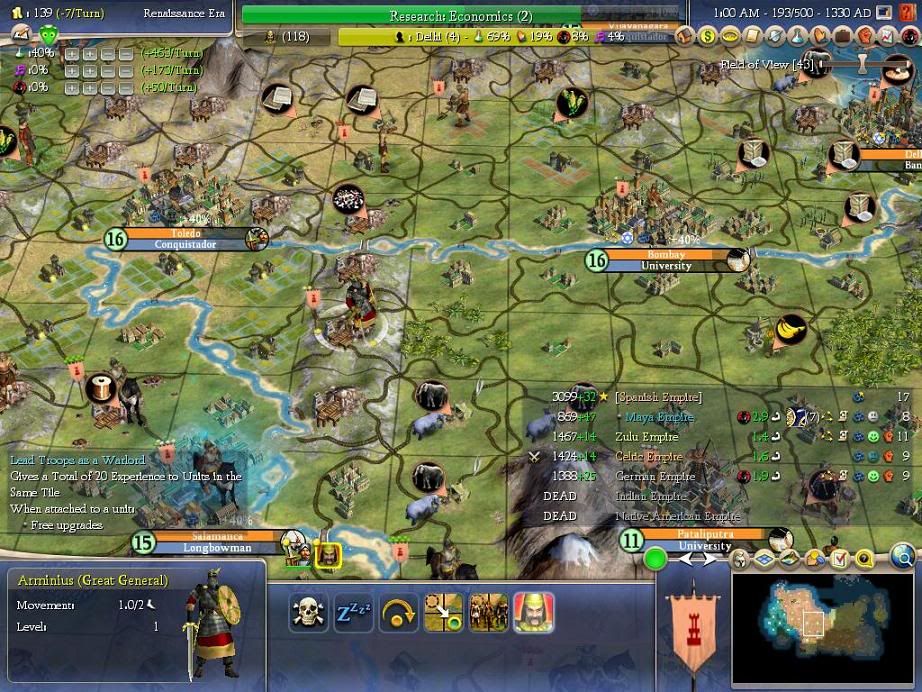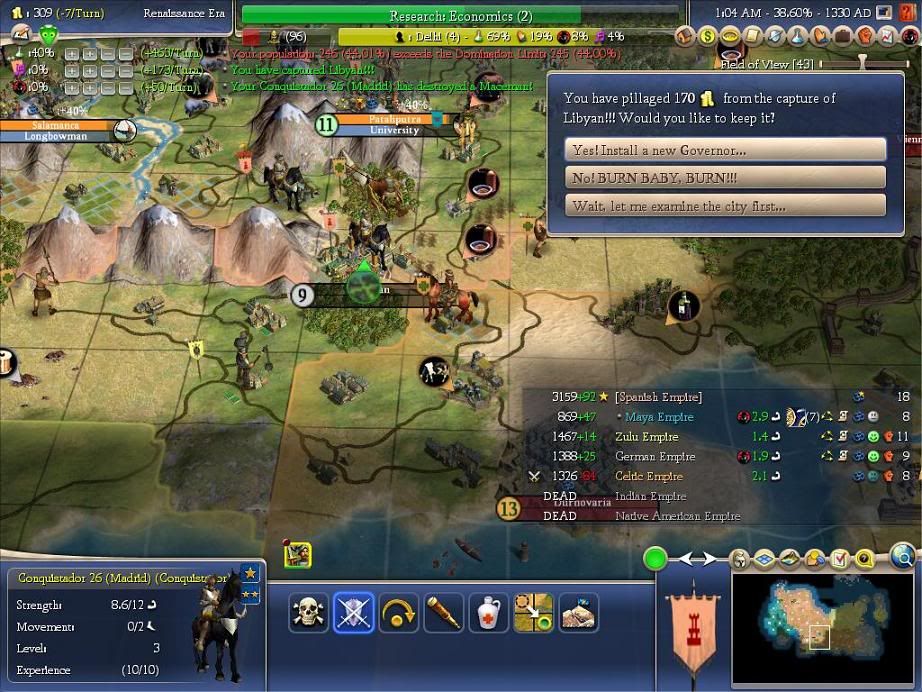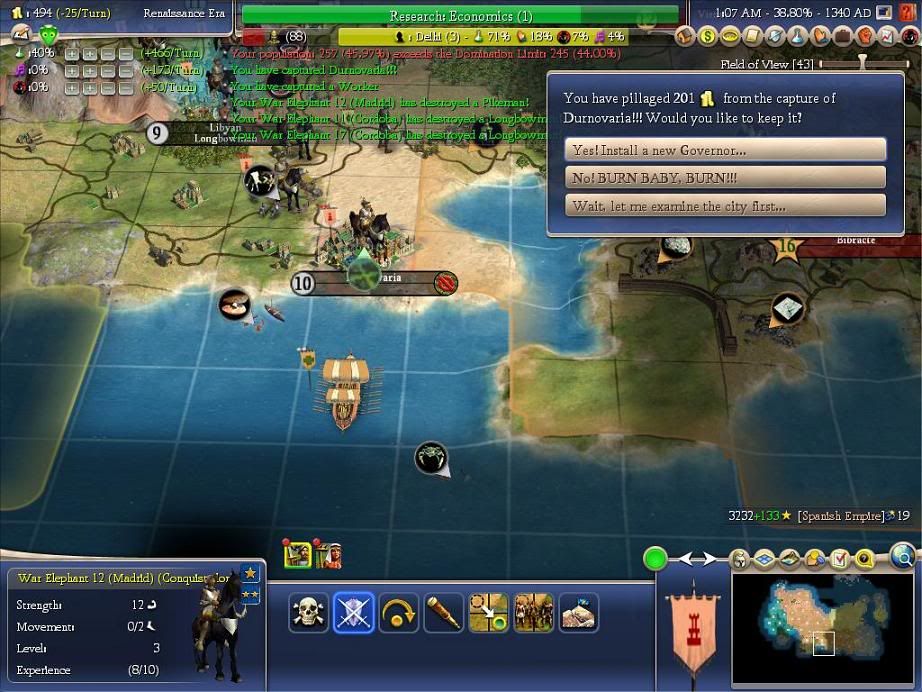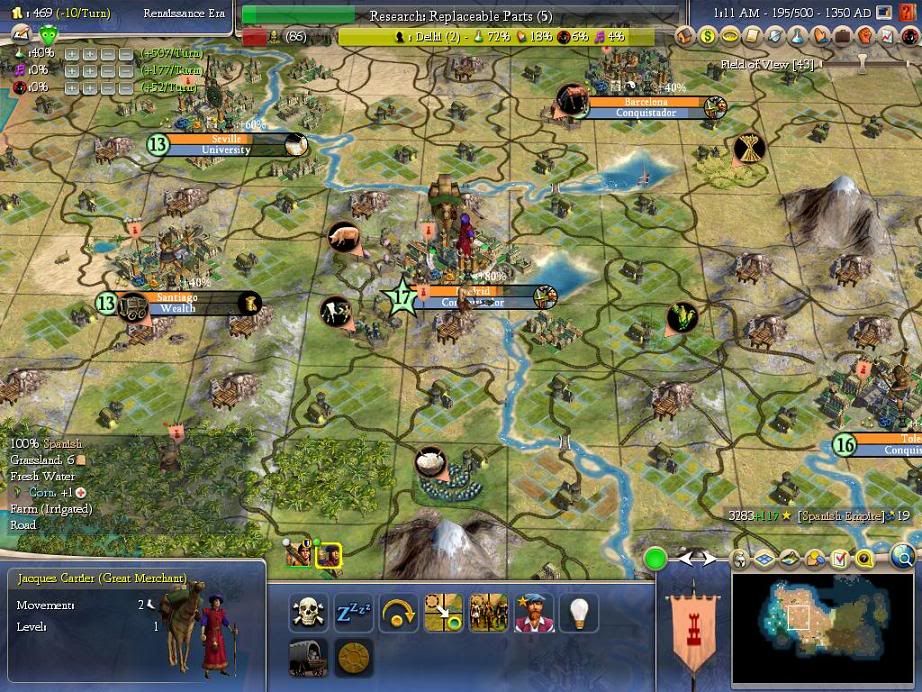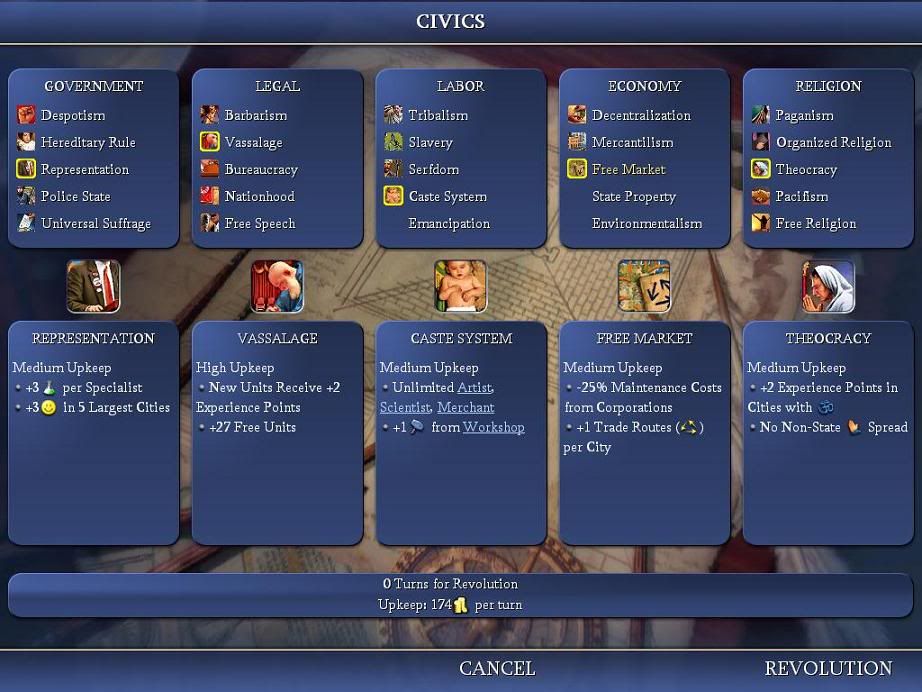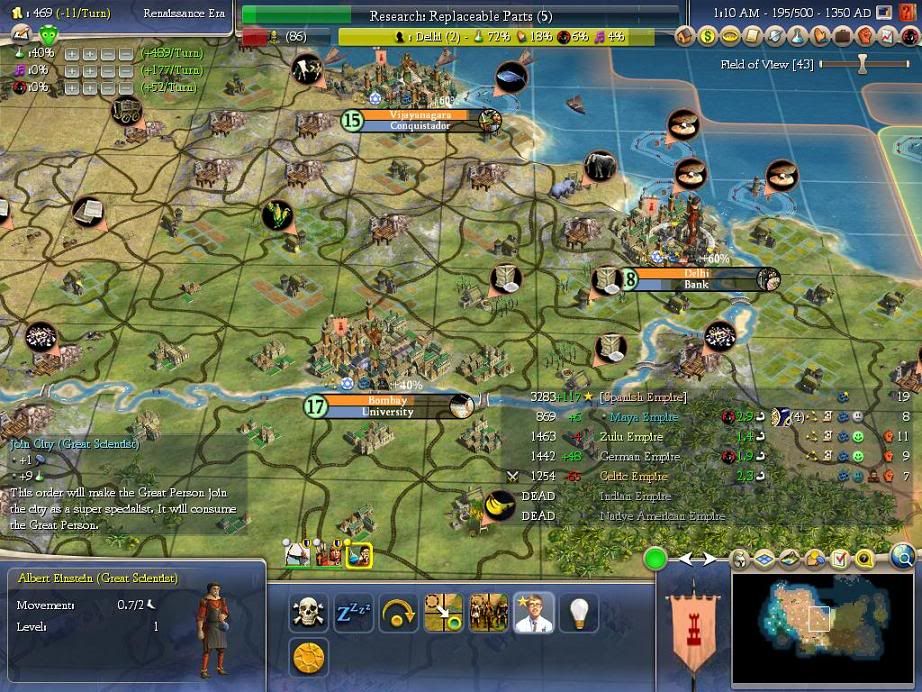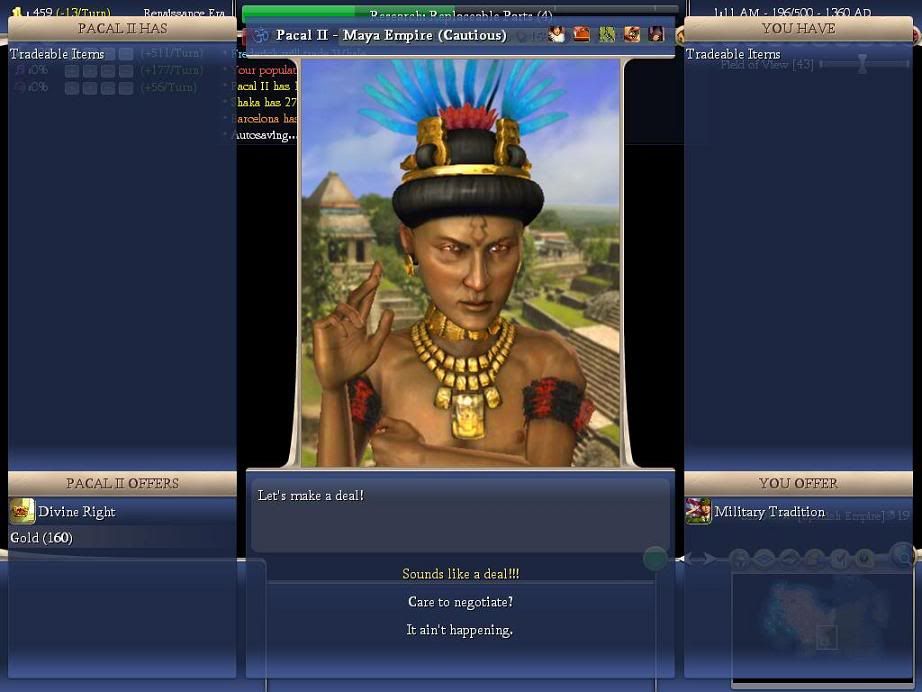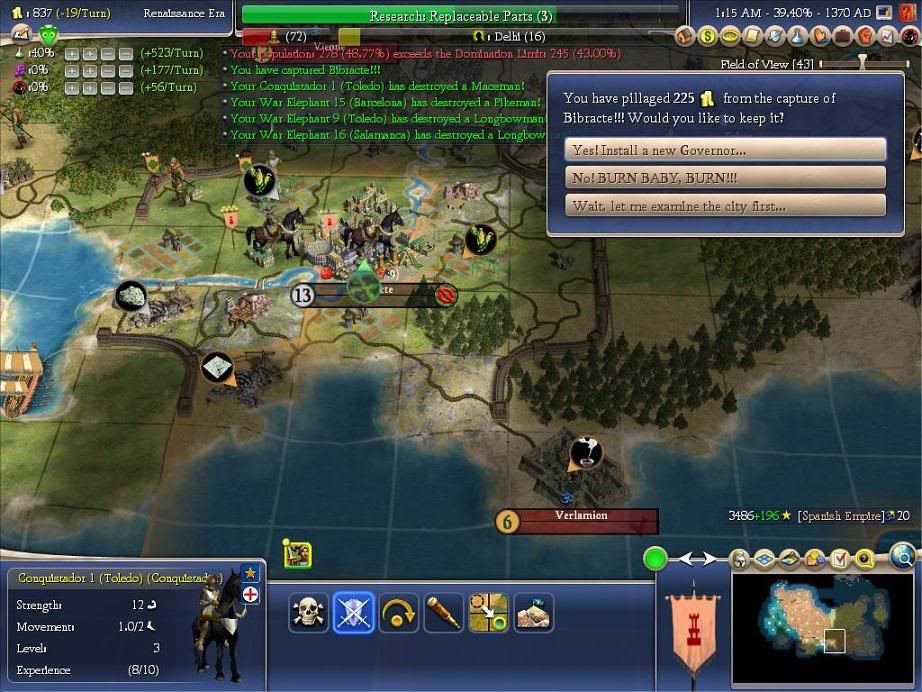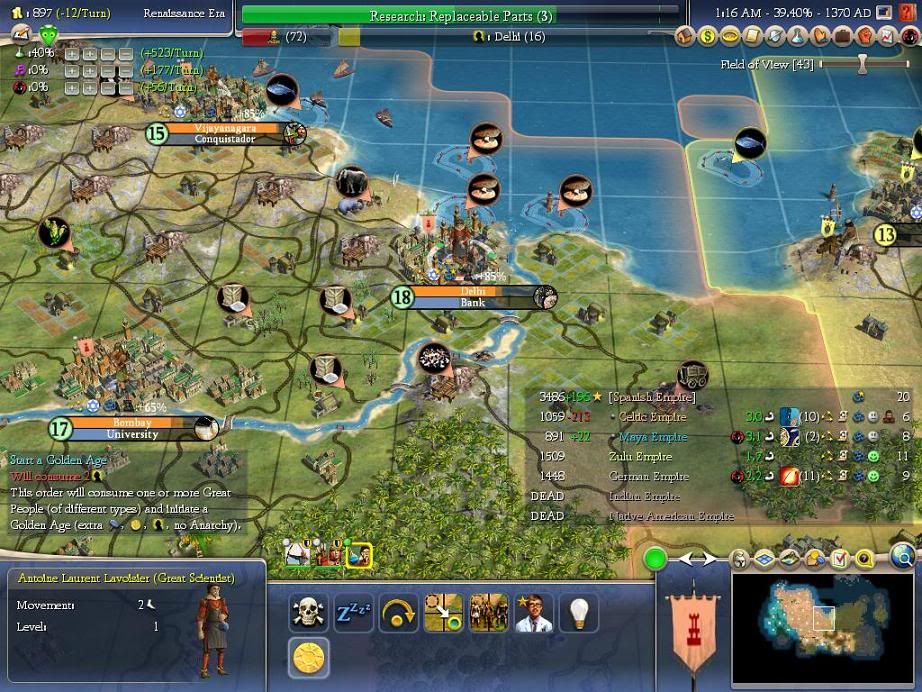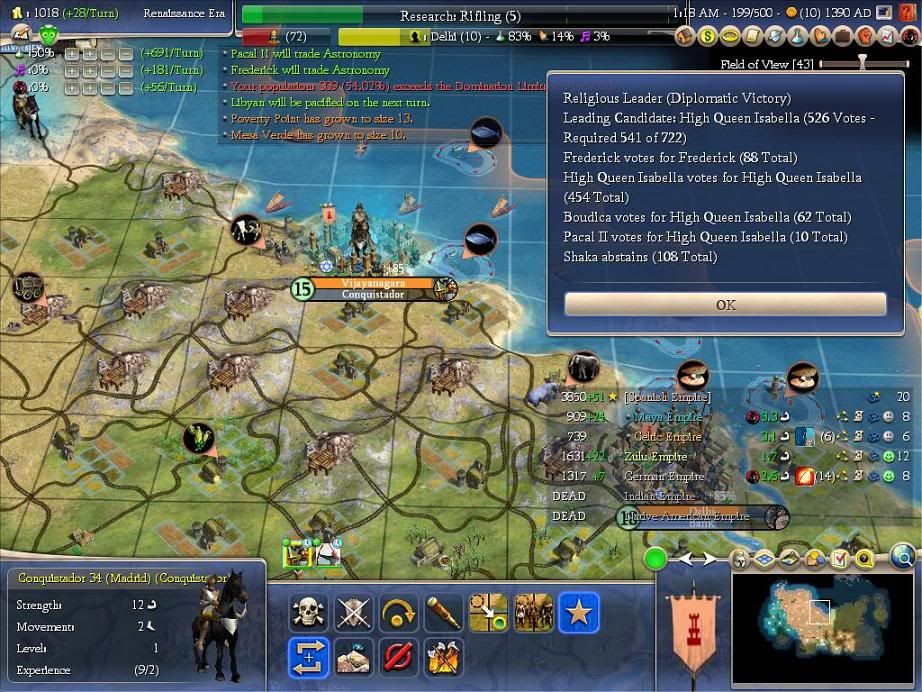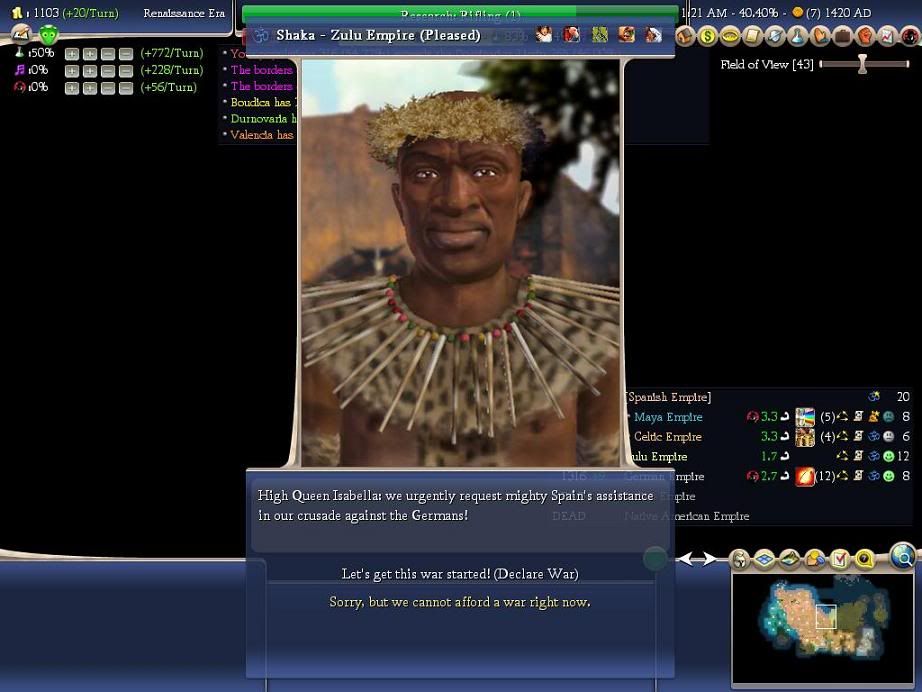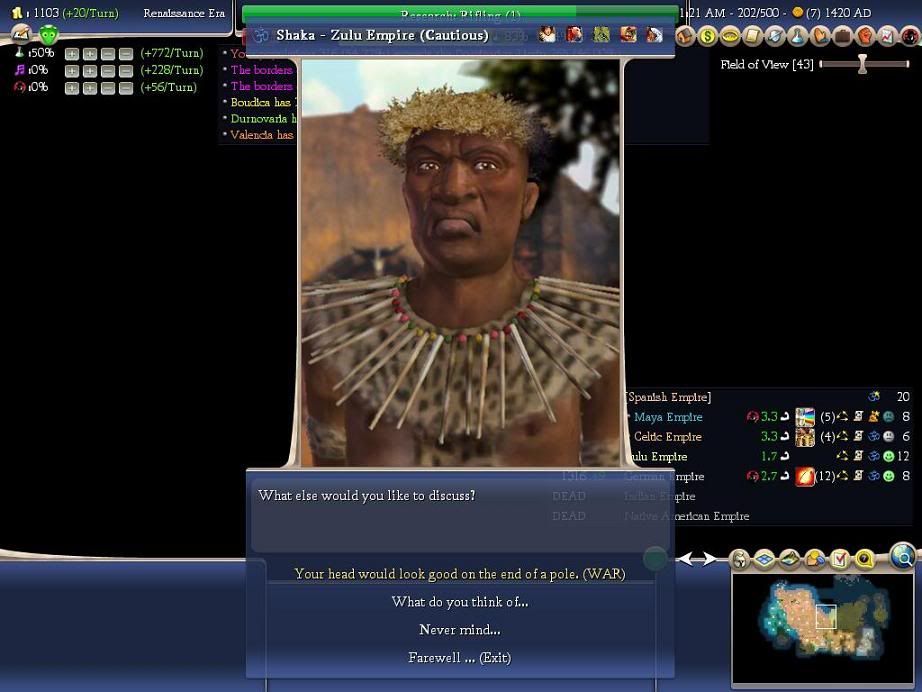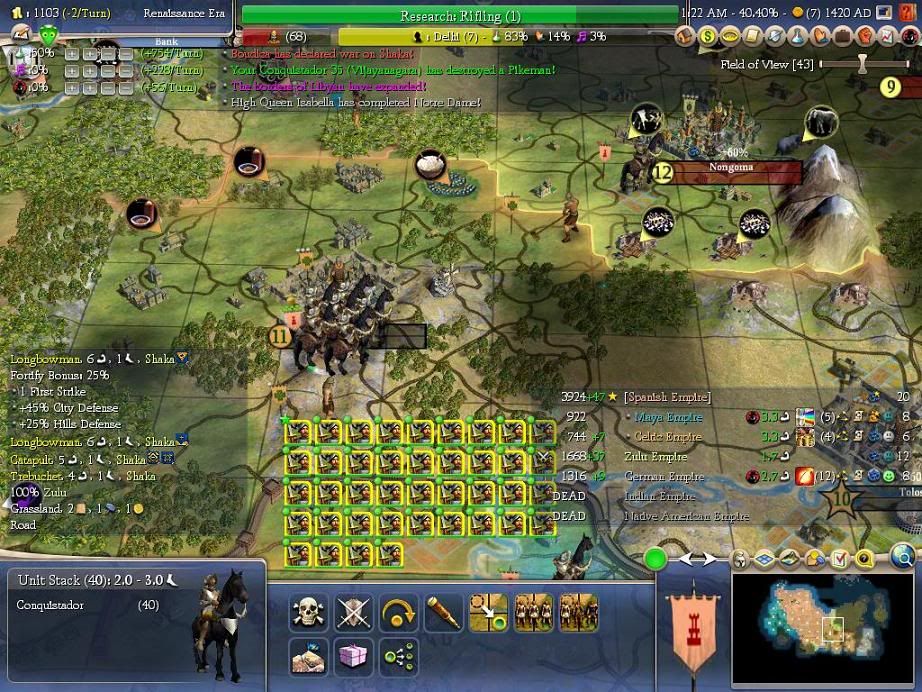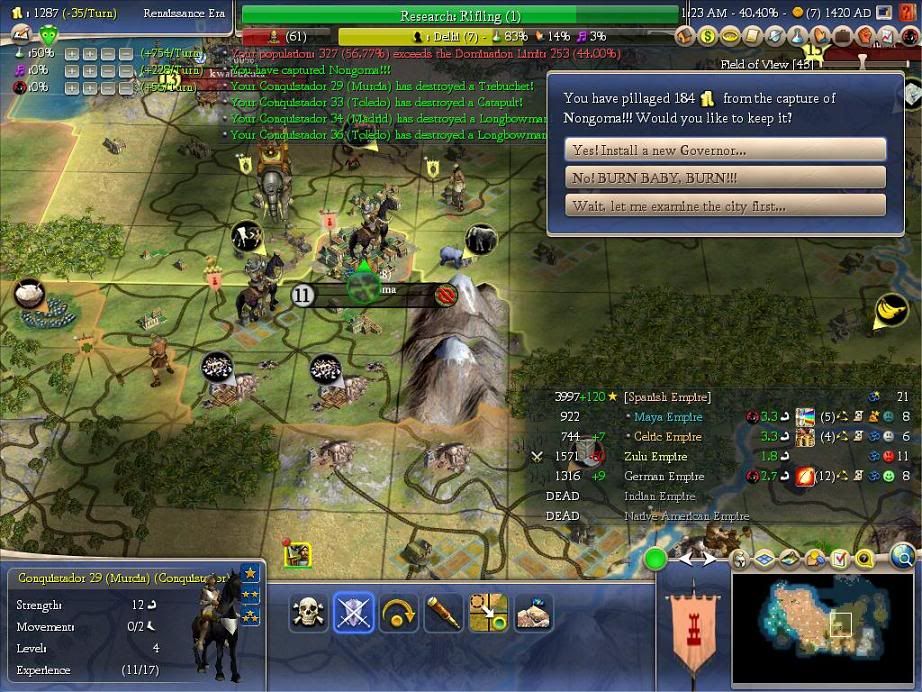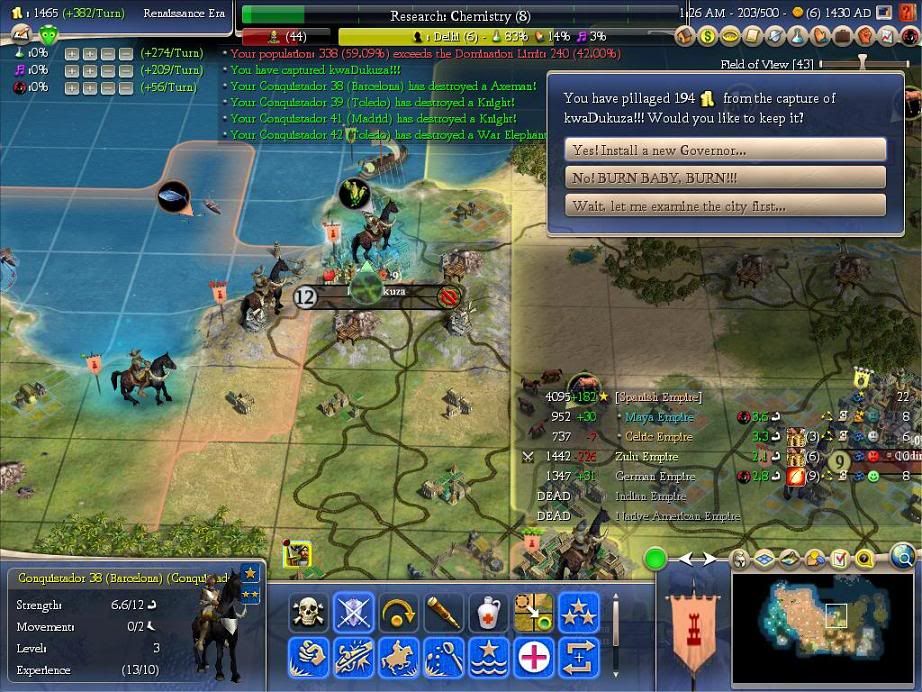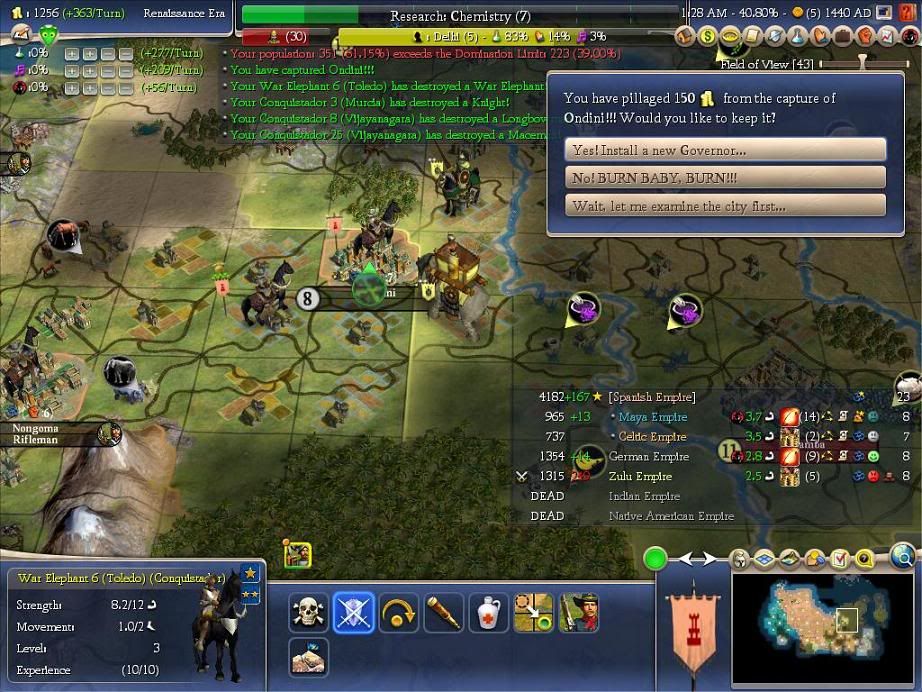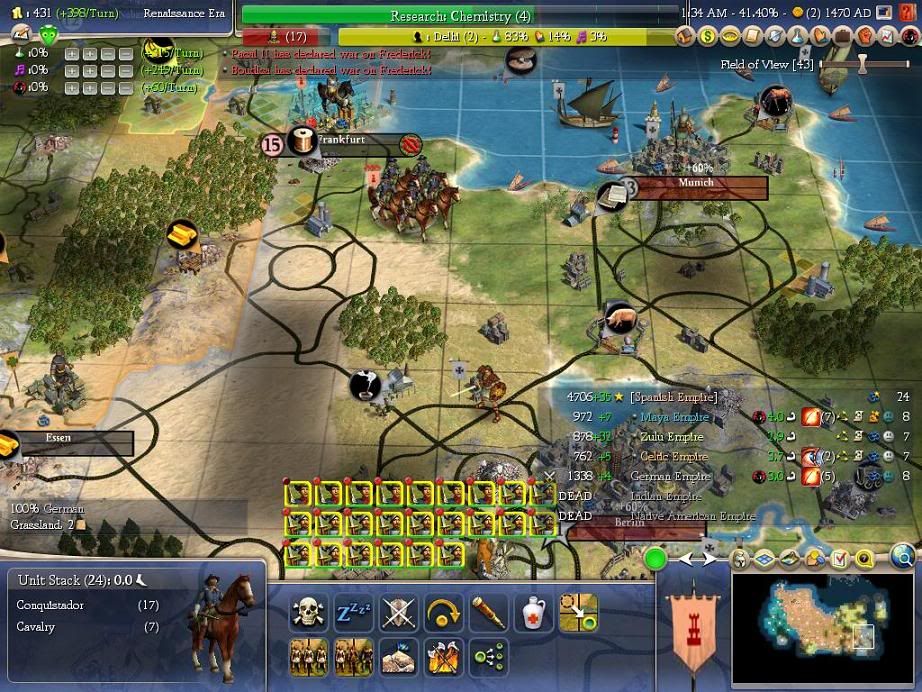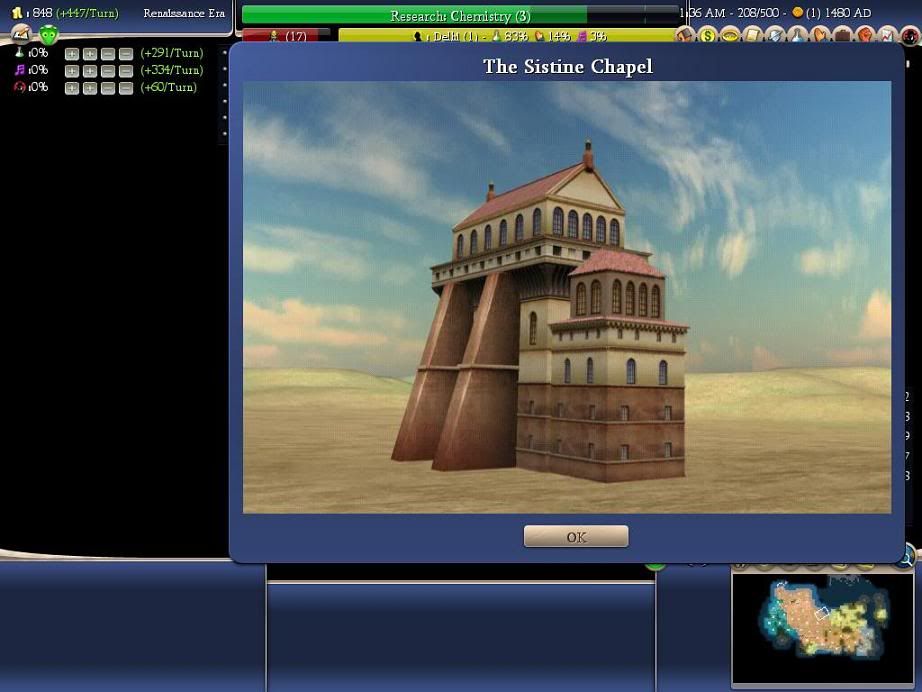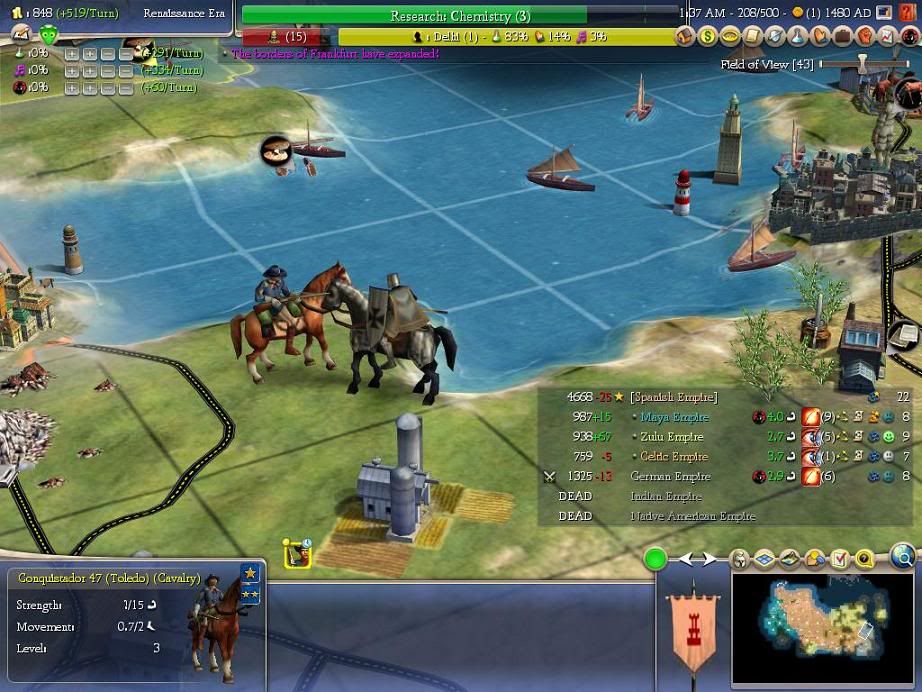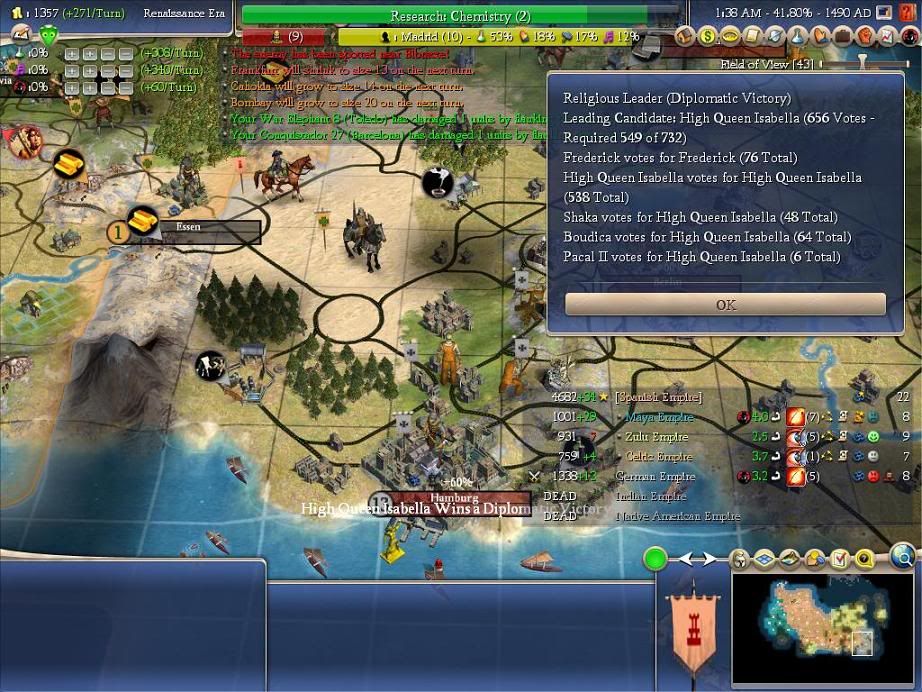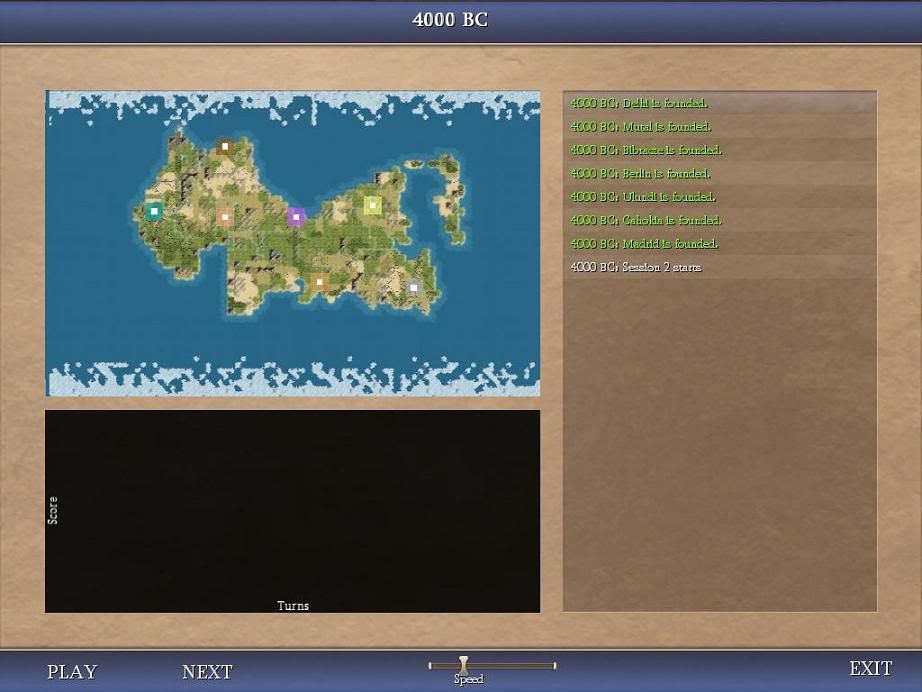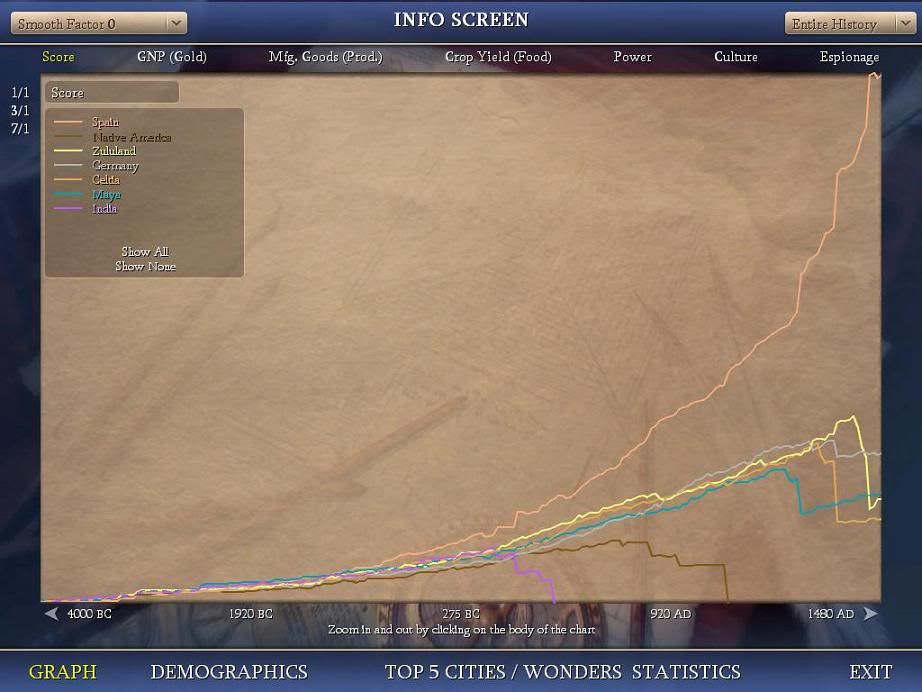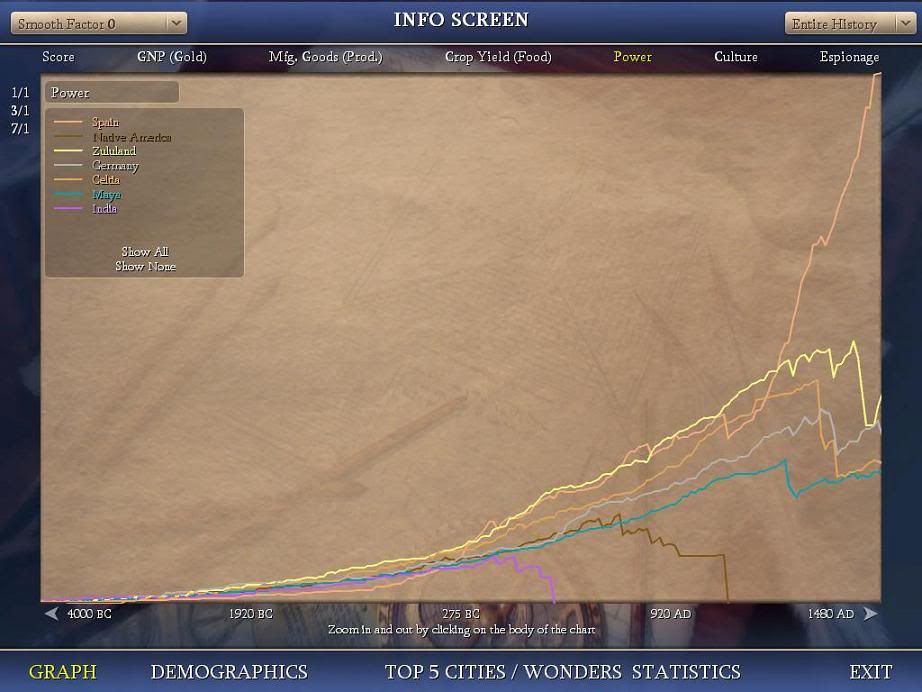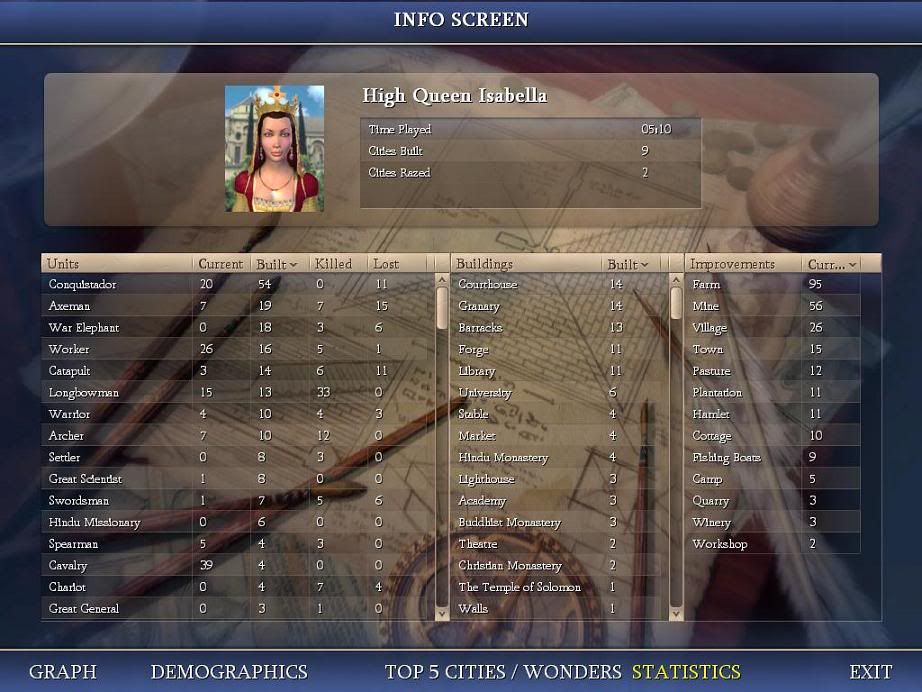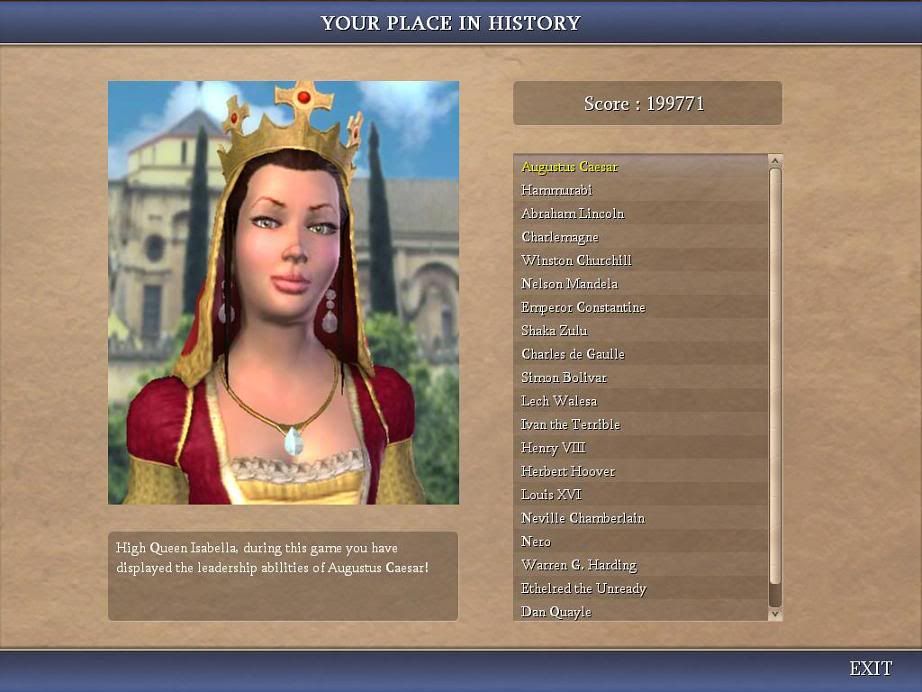Chapter 7
The Apotheosis of the High Queen, Part 1
Goals for This Round:
* MWAHAHAHAHAHAHAHAHAHAAAAAAAAAAAAAAAAA!
When the history of the rise of Spanish preeminence is told, much credit can be given to a number of sources. Certainly, the capture of the Hindu shrine from the Indians centuries ago helped. The Pyramids--and the governmental changes they allowed--were also a factor. However, even the most hard-nosed traditionalist must admit that Spanish ascendance was only achieved when the advent of Military Tradition brought to bear Spain's most potent weapon. Clad in iron helmets and brandishing fearsome swords, they were the scourge of the continent by which the High Queen could transform from local warlord to master of all she surveyed.
In the Mayan Nation, they were known as the Dread Wind. In Celtia, they were called the Demon Spirits of Kali. In Spain, they were simply known as
Los Conquistadores: The Conquerors.
Training of this force began in the captured city of Poverty Point. Isabella knew that the War Elephants had acquitted themselves well in the Spanish-Lakota War, but they were too slow, too ponderous... too weak. The descendants of the veterans of that war traded the traditional elephants for the quick-striking horses of Barcelona as the Spanish military budget allowed.
Indeed, the High Queen did whatever she could to gather more gold in this period, selling trade goods and outdated technology to whomever would buy them.
Spanish research reached a new milestone, and at once, the Spanish Empire changed, seemingly overnight.
The Age of the Taj, as it came to be known, was less of a Golden Age and more of a dark period in Spanish history, known for brutal tactics across the empire. Punitive tax rates allowed gold to flow into Spanish coffers, while governmental changes saw the High Parliament dispersed and the Pyramids shuttered as the previously enlightened senators transformed into brutal petit dictators. The High Queen herself did not emerge, but rumors began to travel throughout the empire that she herself had ascended, transforming from mere human into the living incarnation of the goddess of death Herself, Kali.
The brutality of the new Spanish regime, in which Conquistadores poured forth from city after city, suited Shaka of the Zulu well. His army returned to Zululand, and, squatting at the eastern borders, they found themselves restless. Shaka was furious at having been denied Poverty Point, and he vowed to claim finer cities from his own brother in the faith.
The German-Zulu War was a precursor to what was to come, and Zulu forces began capturing German cities at breakneck speed, consolidating power in the East in a way they couldn't in the West.
The High Queen remained unseen through this campaign. She neither supported nor condemned the Zulu effort simply because she could not be found. Indeed, it almost seemed without her consent that the Conquistadores of Poverty Point poured across the border into Mayan lands.
The War of the Goddess--as it came to be known--had begun.
Delhi--still in chaos at the dissolution of the High Parliament--spawned a wise woman named Sojourner Truth. With her bald pate and long white beard, she stood before the Indian people and asked, "Ain't I a woman?"
She helped the Indian people construct the Temple of Solomon commemorating the ancient holy place of the Jewish faith.
In the West, the Conquistadores swooped down upon Saxon...
...and burnt the city to the ground.
The border city of Mayapan had a weak garrison...
(That's after a round of attack, but still!)
...that collapsed quickly.
It meant little at this juncture, but Settlers from Madrid established the port town of Valencia not far from Salamanca.
Meanwhile, in the East, Frederick of Germany was on the receiving end of the Zulu's brutal military tactics. While his core was safe, Shaka had captured many of his border cities, leaving the German people prisoners in their own land. Desperate for a way out, Frederick authorized the creation of a worldwide Hindu council situated at the Apostolic Palace of Berlin, where he--as Maharajah for the Hindu people--could maintain peace, order, and civility throughout the land.
It was at this juncture that the High Queen emerged from the Pyramids at last. Those few whom she counted among her close friends saw her as now different. The insecurities of the past had been replaced by a grim certainty, and her every movement seemed to come with almost divine authority. Her flowing, ornate gowns had been replaced by thick leather plate, and her crown had been replaced by a crested helm.
"South," was her sole word, and her Conquistadores hurried from the ruins of Saxon toward Mutal.
Terrified at the proceedings, King Pacal's spirit broke, and he submitted himself to Isabella's rule.
"You will give me your lands," Isabella commanded at the capitulation ceremony at Stonehenge.
"Yes, my people are yours to command," Pacal murmured.
"You will share not only the secrets of Drama, but also those of Engineering," she said.
"Yes, yes!" Pacal answered. "Anything!"
"You will recognize your place not as king, but as local lord," Isabella continued. "You will recognize that we had met the Buddha and, indeed, we have killed him. You will revere me not just as High Queen, but as an awakened goddess of the Hindu people."
"Whatever you wish, if you will but spare my people!" Pacal wept.
With that, Isabella turned on her heels and returned to the Pyramid with a slow, steady gait, stopping once before she entered.
"Inform the warlord of the East. I will not be denied. Frederick is not the Maharajah; I am."
At the High Queen's emergence, the Age of the Taj came to an end. Representative government returned, and Slavery was abolished. The local lords, however, retained their position, assuring that the brutality of the Spanish military would continue to be recognized.
Pacal, seeing what was to come, agreed that he would not merely serve Isabella, but would worship her.
Seeing his bid for peace fail, Frederick decided to at least make an attempt to secure help in his war against Shaka, which continued unabated even to this day.
But the High Queen was unmoved by his entreaties. "You presume we are a people at peace who can spare our conquerors to help your besieged people," Isabella said in her meeting with Frederick. "But the War of the Goddess continues. If we are to rescue your people, I ask that you submit wholly to me, recognize my authority granted by Kali Herself. Give your people to me as Pacal has done, and I in my infinite power will rescue you."
King Frederick left the Pyramids quickly, muttering that the Spanish High Queen had gone mad.
Such suspicions seemed to be confirmed when the Conquistadores gathered in southern India and swarmed to the south into Celtic lands.
"You jest, my friend!" Boudica laughed. "The bond of friendship between us is stronger than petty differences of the faith!"
But even behind her smiles, the High Queen could sense the truth. The Celtic army had assembled in Libyan, just off the border, in forces too great to be a mere garrison. Boudica was no dainty lady; she was a fierce and brilliant general in her own right. Some said that the assault on Libyan was motivated by respect between rival queens, a bit of gamesmanship to demonstrate who was stronger.
Those few who served close to the High Queen, though, knew that ideas of respect and camaraderie had been abandoned from the moment Isabella had emerged from the Pyramids at the end of the Age of the Taj.
The assault on Libyan--less a battle and more an extended butchering--saw the rise of General Arminius, who led the Knights Hospitaller to the front of the battle.
Libyan was overwhelmed...
...and, ten years later, reserve forces secured Durnovaria in the south.
Economic prosperity continued to, at last, be more than just a mere dream, as a merchant in Madrid named Jacques Cartier rose to revolutionize Spanish economics.
(Mercantilism probably would've been better, but to be honest, we'd won, and I was tired of managing all of those specialists.  )
)
A physicist from Seville settled in Delhi...
...and Pacal continued to be a pandering little toady.
The High Queen, long ago recognizing her divine right to the throne anyway, accepted the deal simply to demonstrate her mercy to the Maya.
It wasn't long before the Conquistadores at last tore through the forests of Celtia, where they found their goal: the shining city of Bibracte.
Queen Boudica had observed the splendor of her capital, with heavy Stone and shining Marble, and had turned the town into a city of wondrous construction projects. Now, at last, these buildings fell under Spanish control.
Seeing that little else could be done, Boudica traveled to Stonehenge herself. She laid her crown on the ground and dropped to her knee.
The curious Spanish queen, emerging from the Pyramids, traveled to Stonehenge alone. There would be no grand ceremony of capitulation this time; instead, she laid her hand on Boudica's shoulder.
"You understand now," Isabella said.
"I'm sorry I spurned you," Boudica replied. "I'm a fool, and I now know to recognize omnipotence when I see it. You are no mortal; you are Kali, destroyer of all that is."
There would be no need for a ceremony. The High Queen allowed Isabella to live, to rule her lands, and to command her armies. Her old friend would serve her well in the coming years.
After all, the War of the Goddess was not yet complete.
(To be continued!)
 )
)
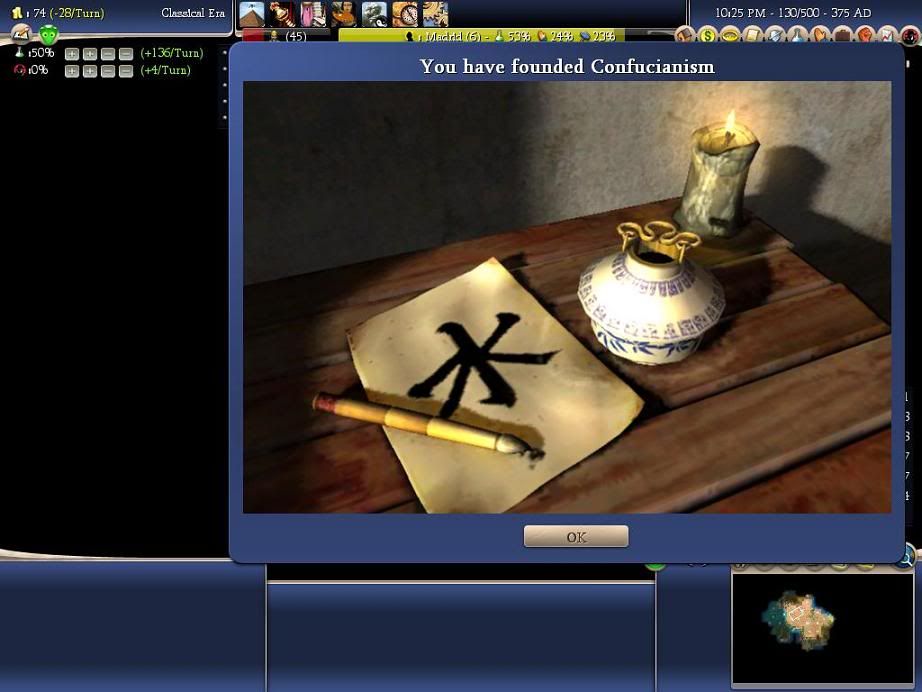
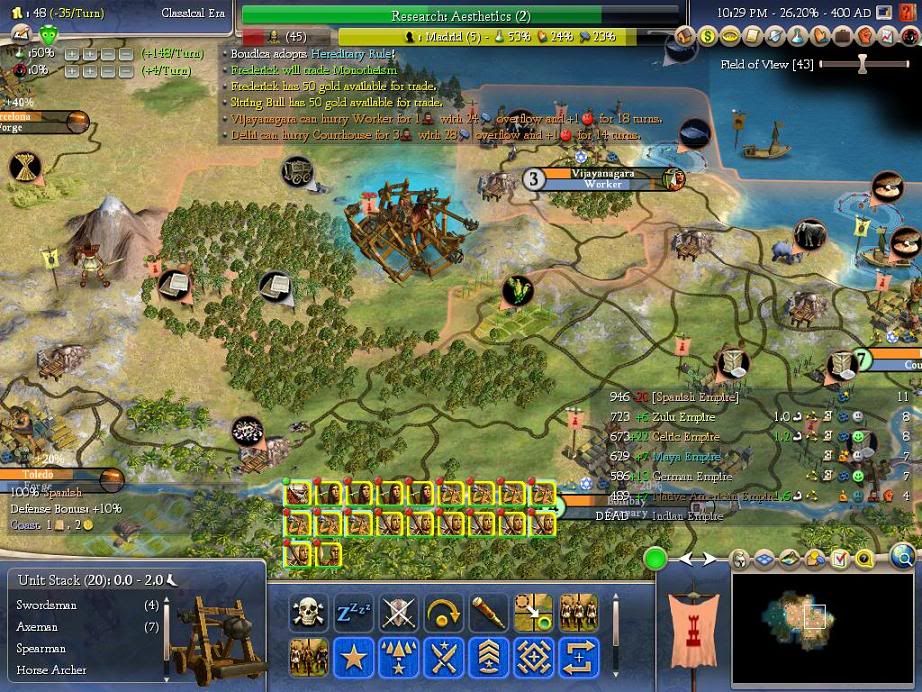
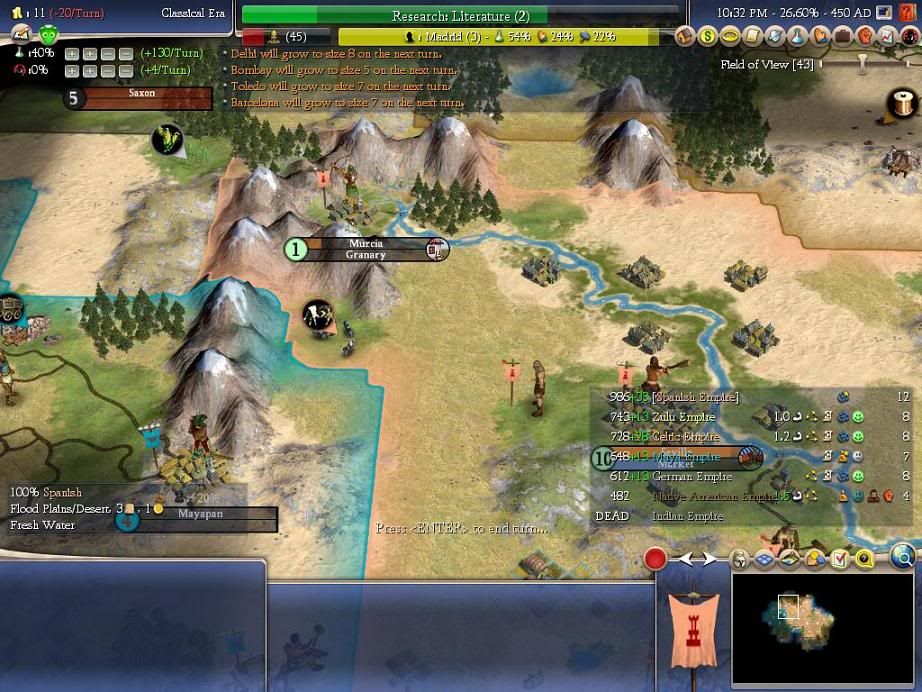

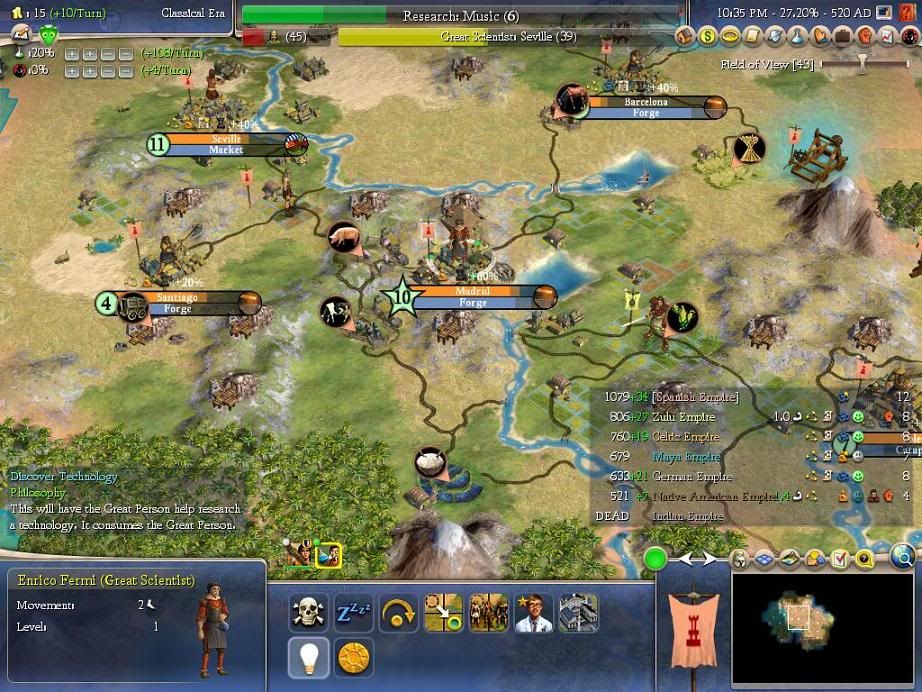
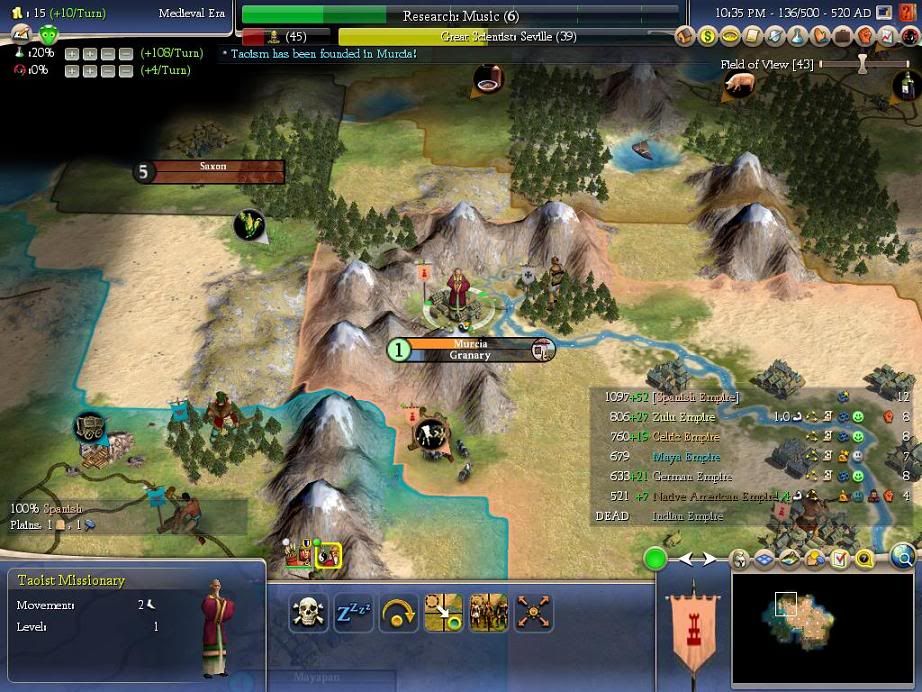


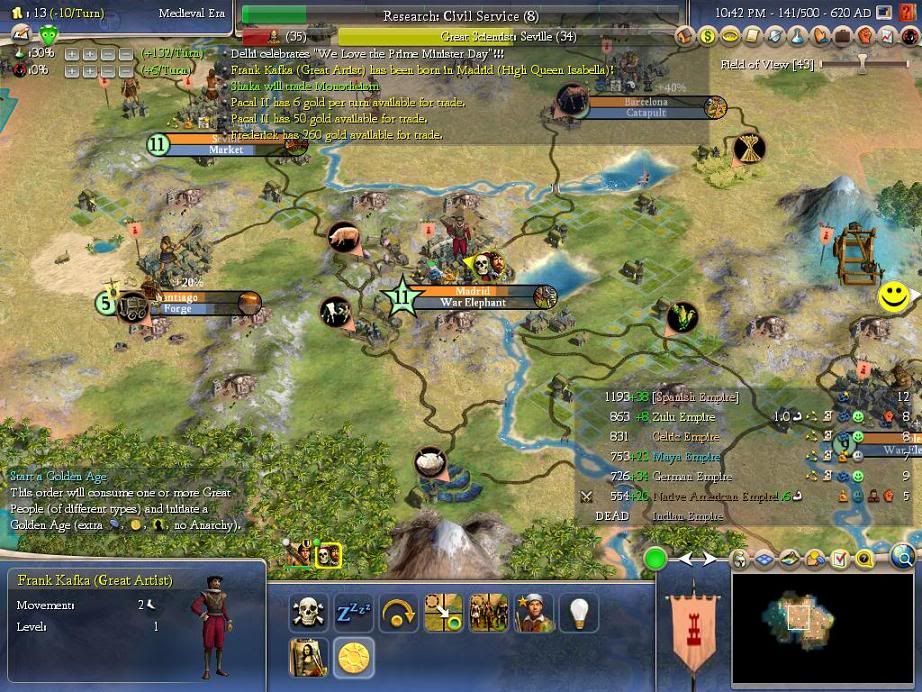
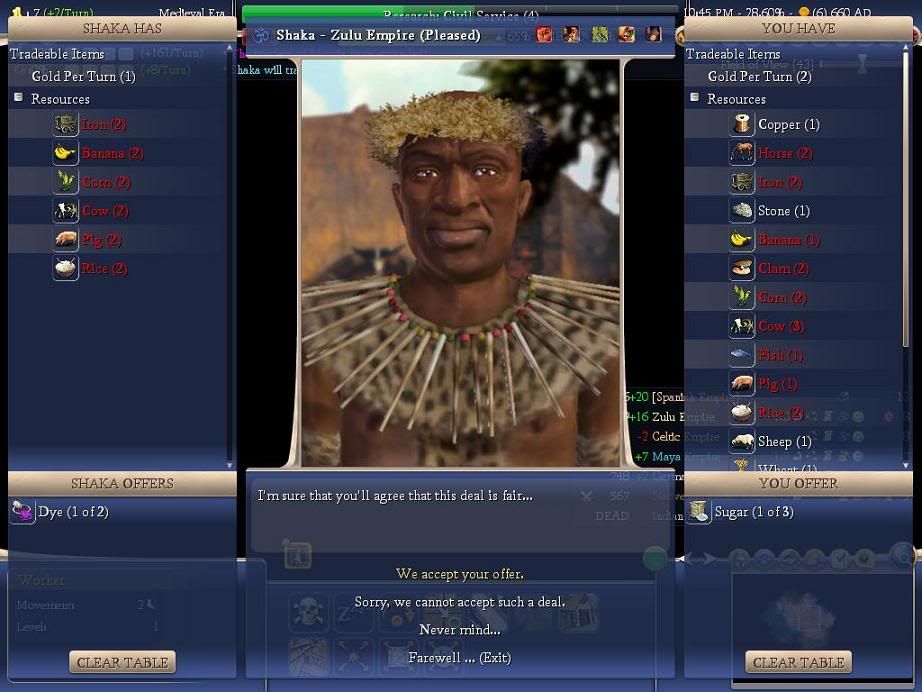
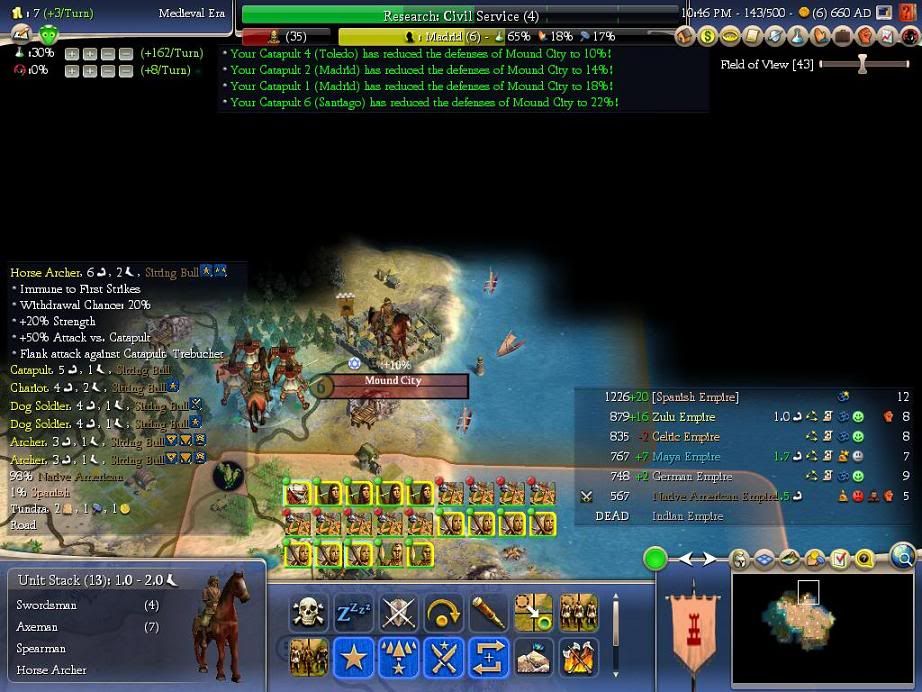
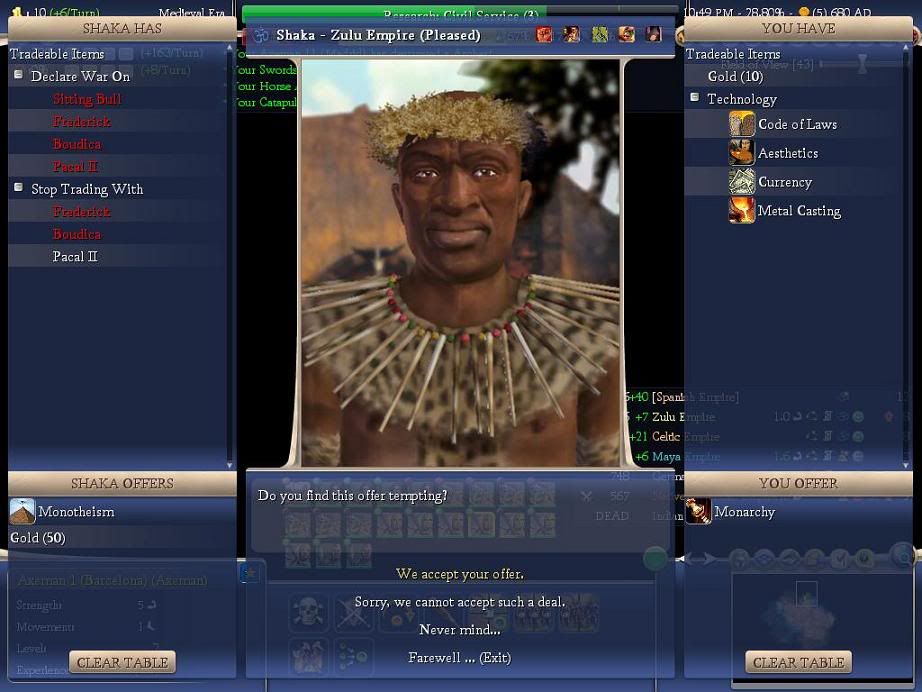
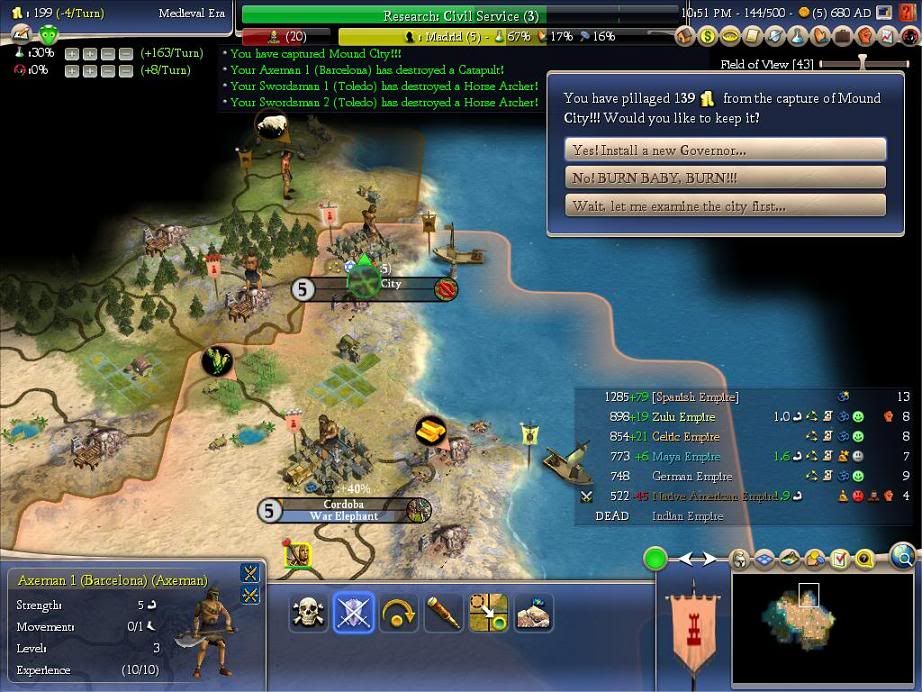
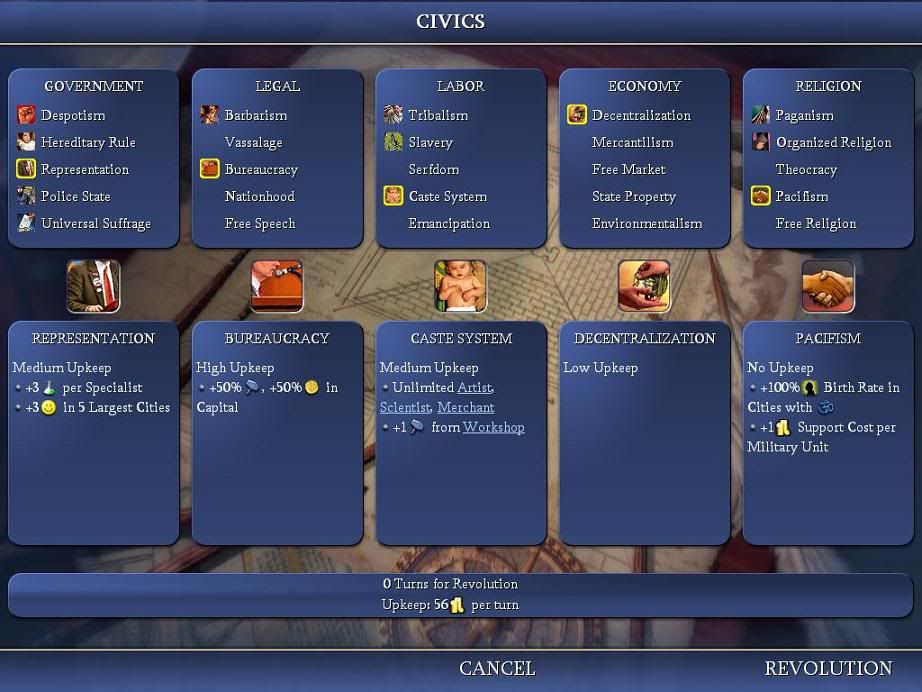
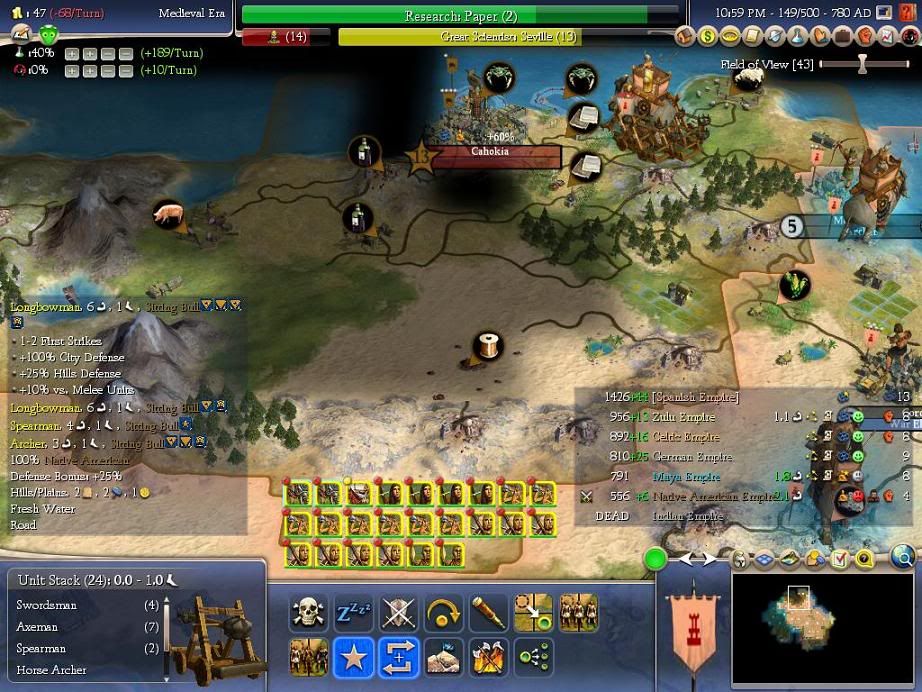
 Well, this ain't gonna be pretty.)
Well, this ain't gonna be pretty.)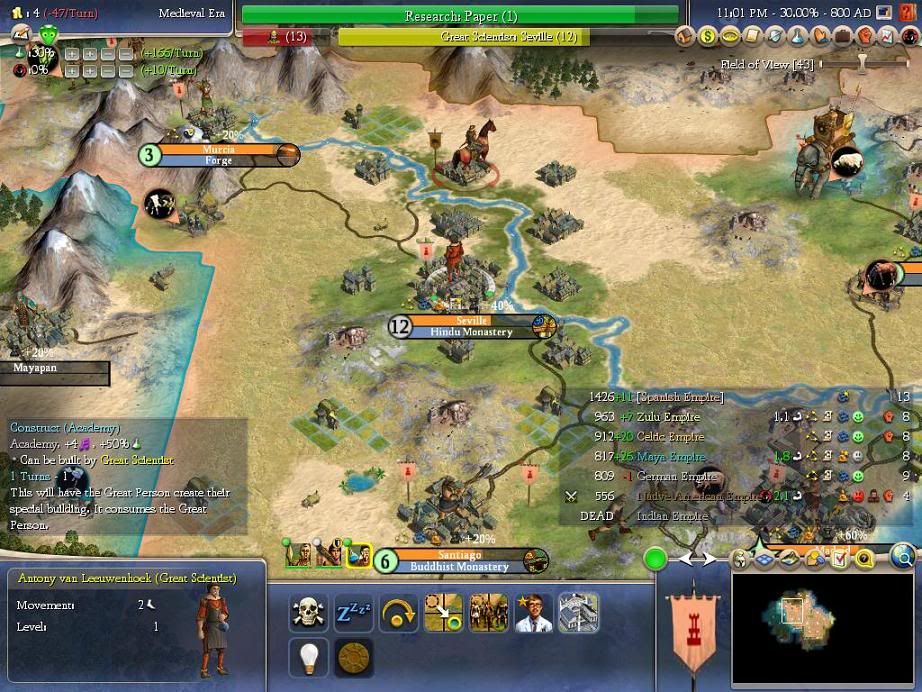
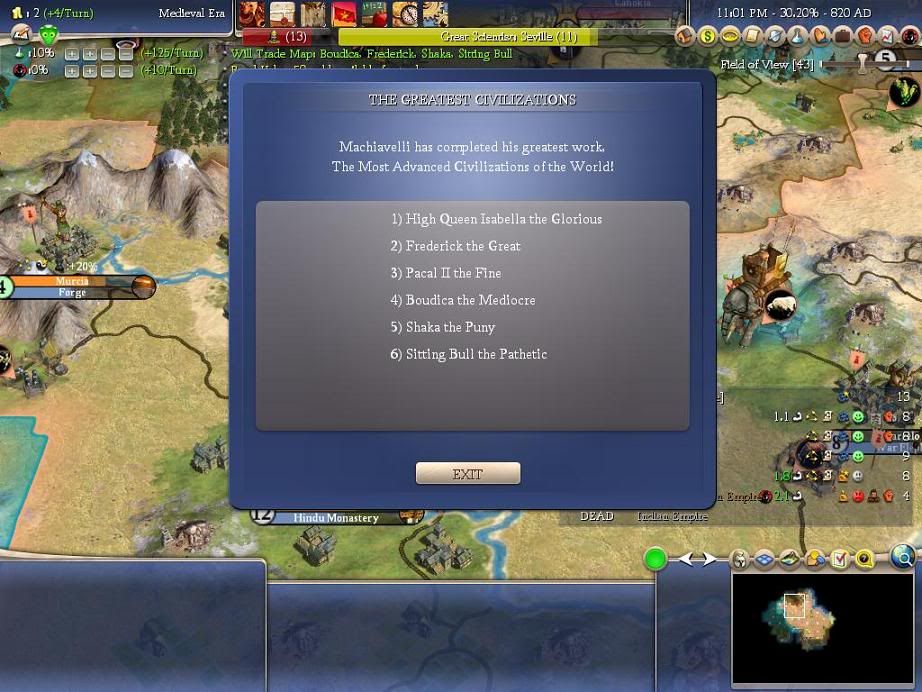
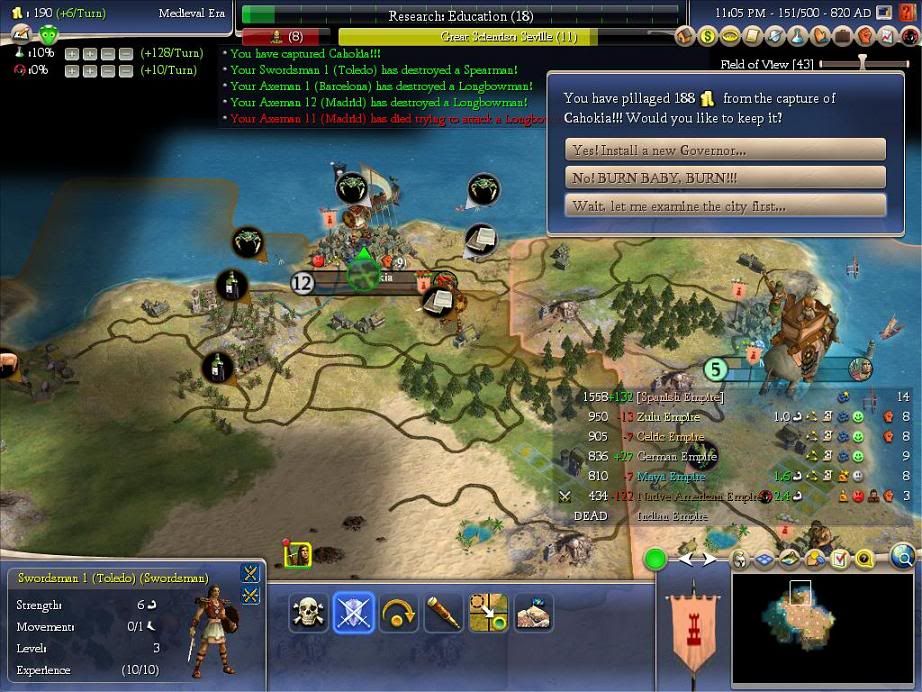
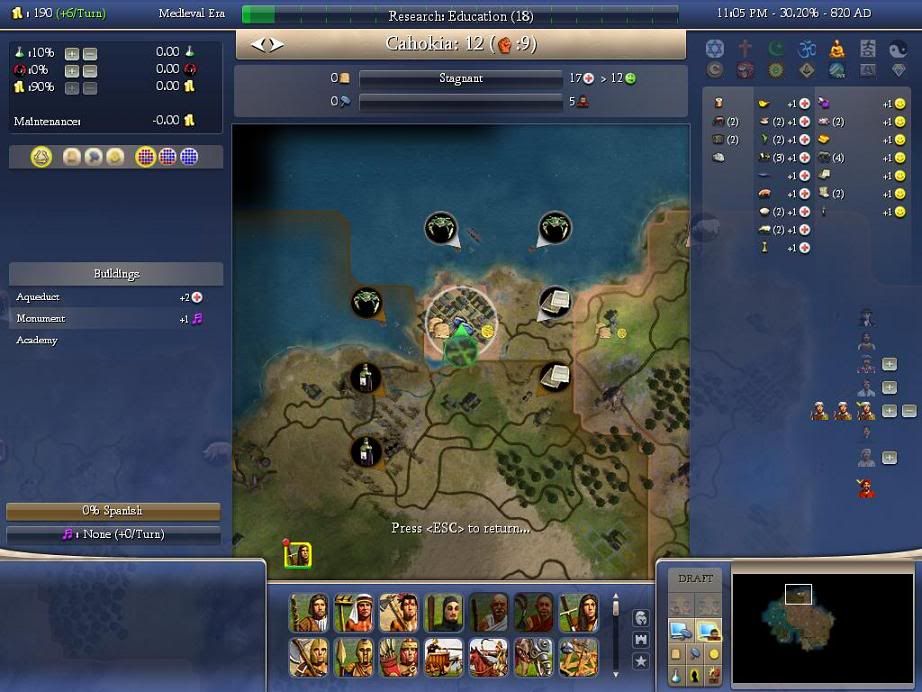

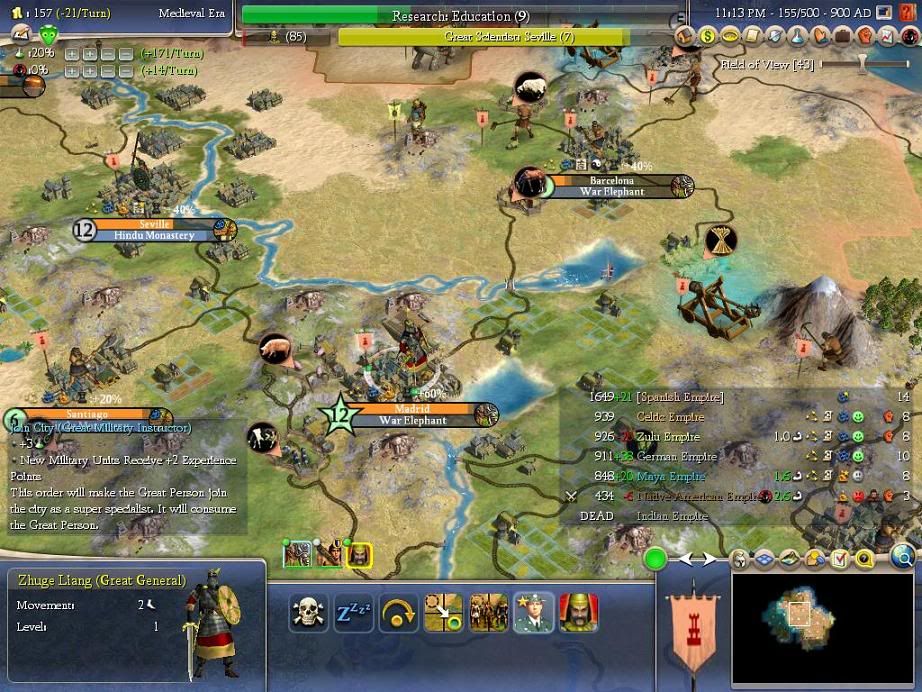

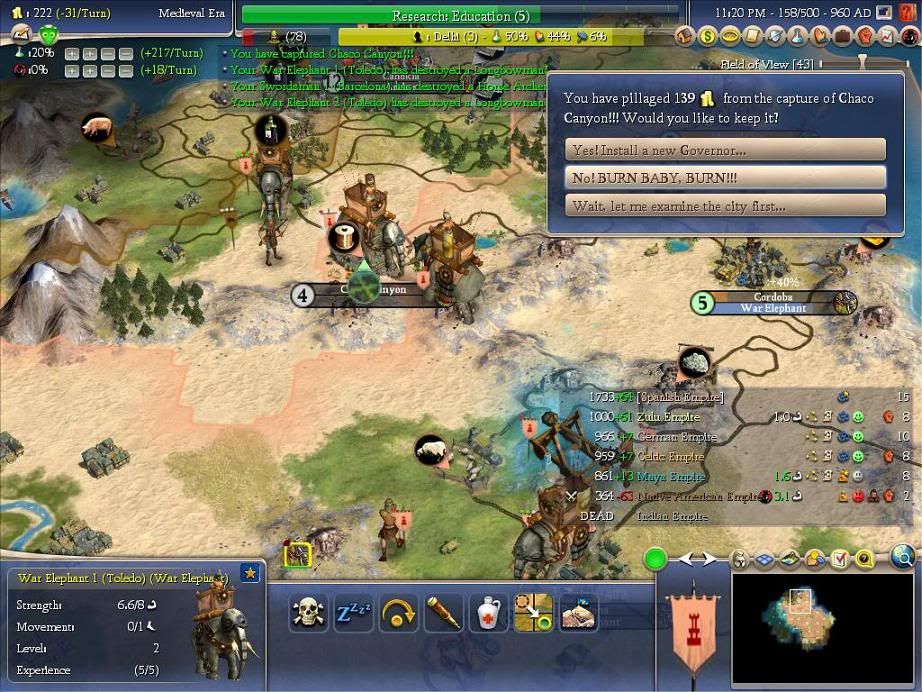

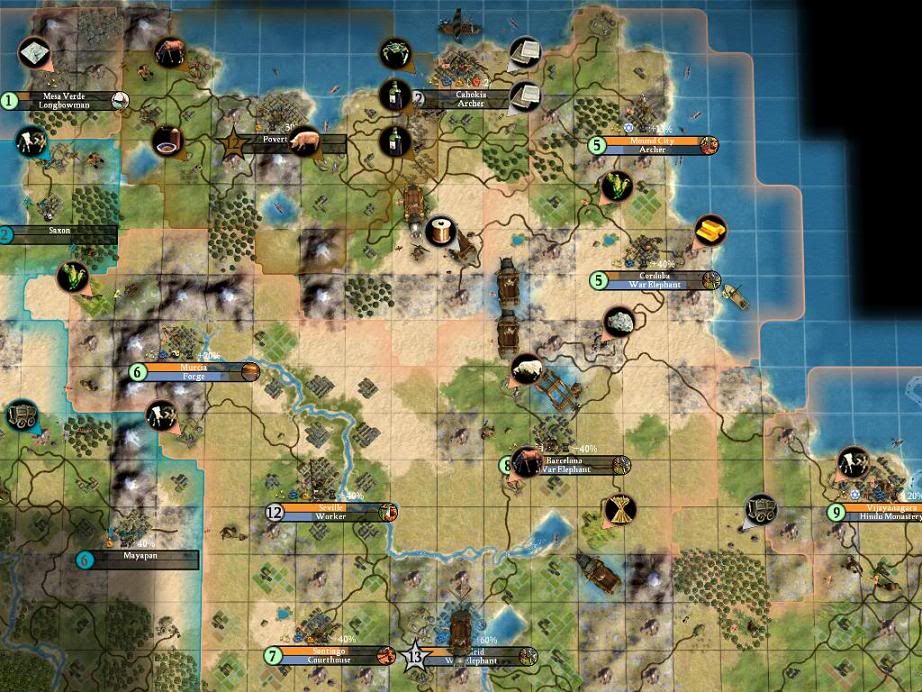
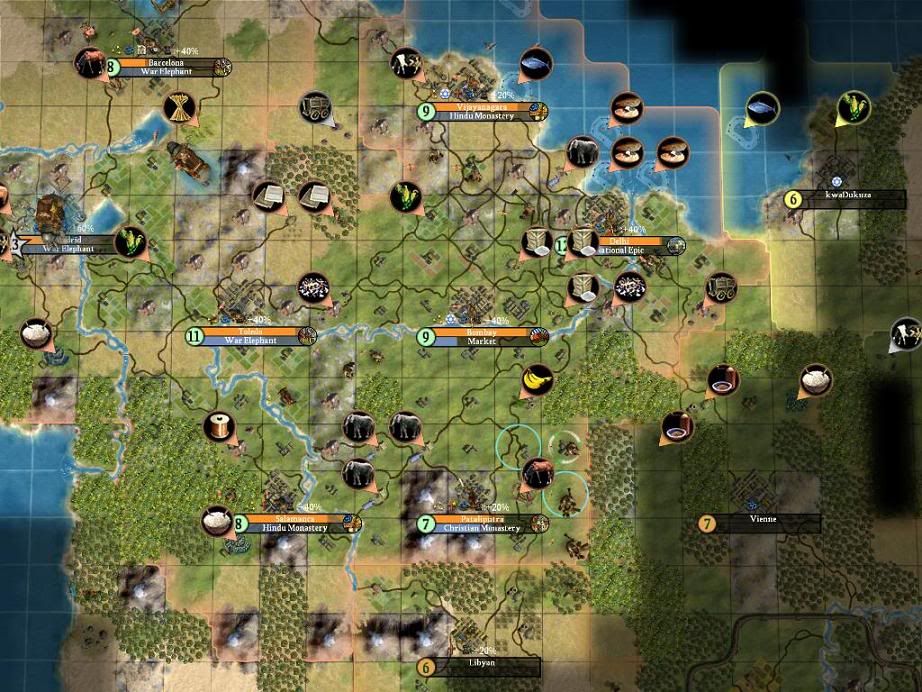
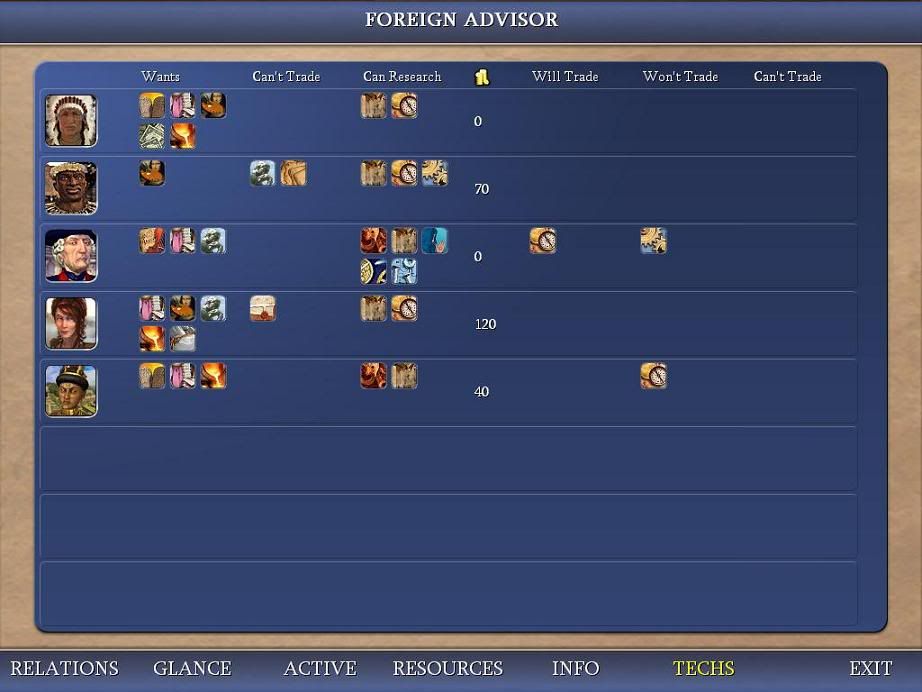
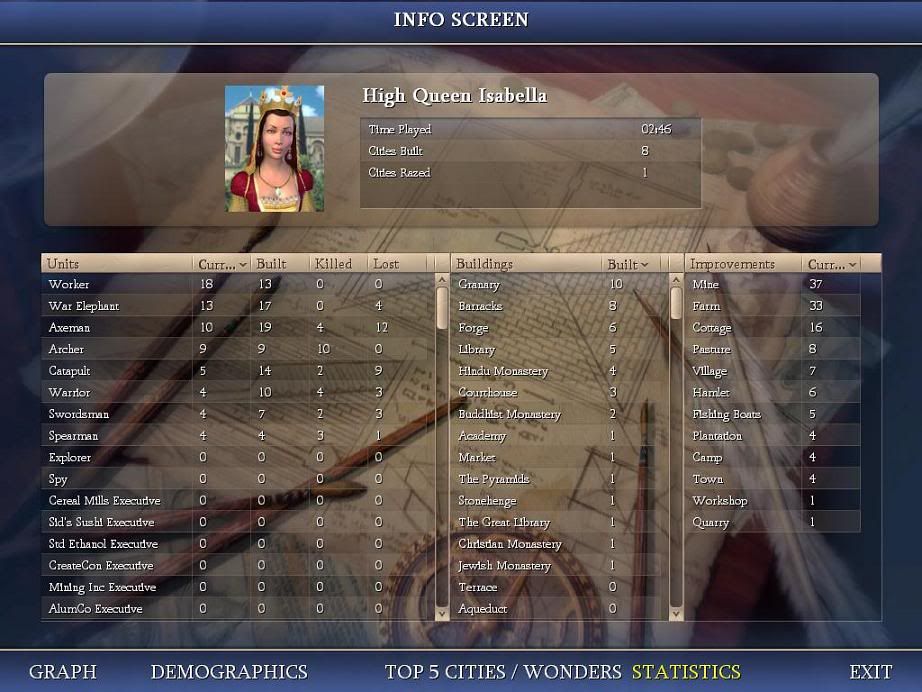
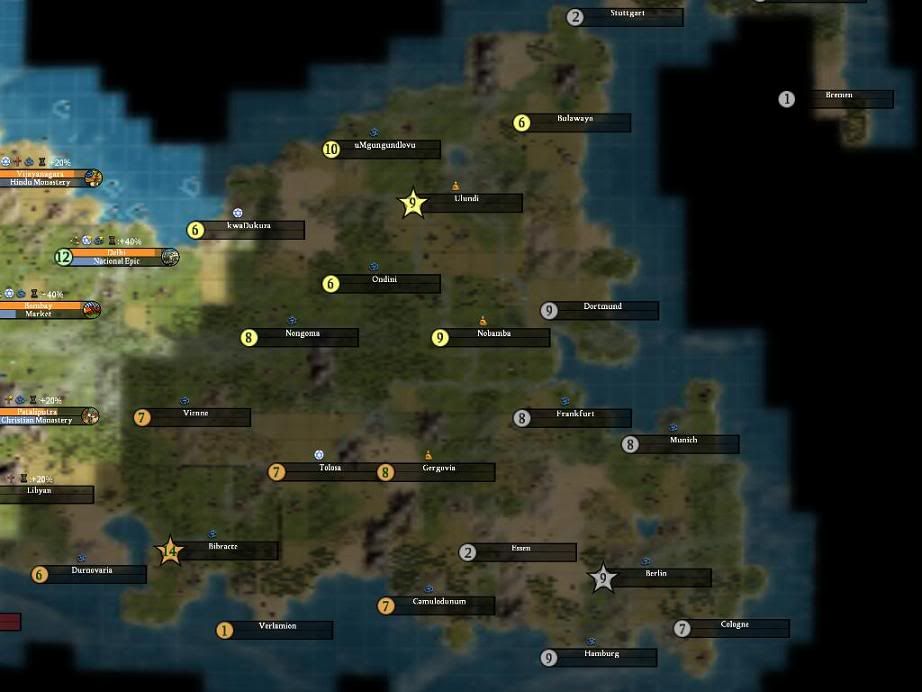
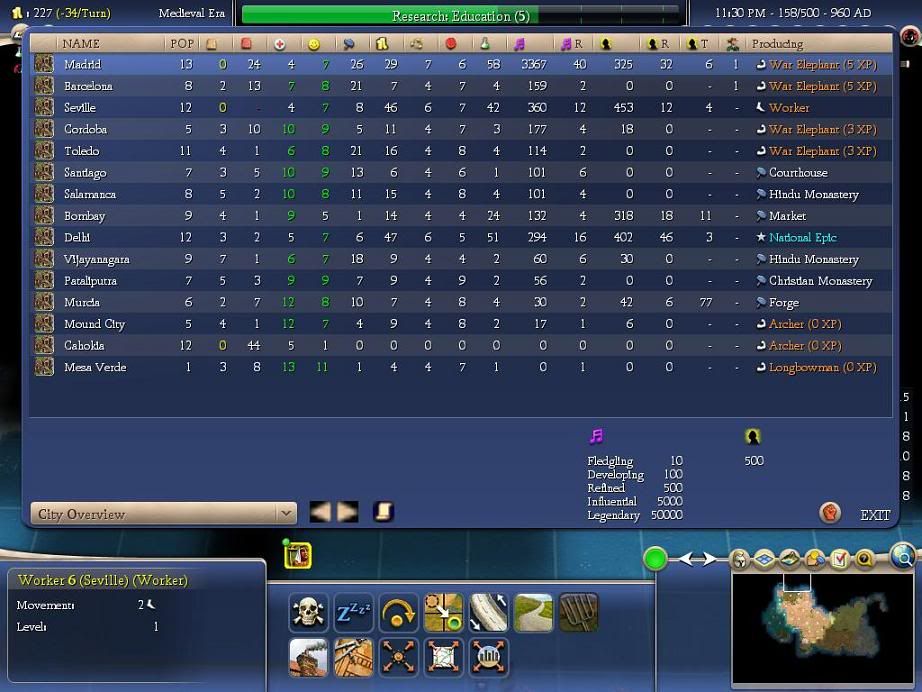
 I'll take a look at your 960 AD save and comment later.
I'll take a look at your 960 AD save and comment later.  You were right to continue BTW....learning is fine but secondary to having fun. Two great write ups too! “Bell communicator”
You were right to continue BTW....learning is fine but secondary to having fun. Two great write ups too! “Bell communicator”  Brilliant!
Brilliant!
 My congrats meanwhile follow on from my earlier post where I suggested taking down SB pre-LBs, which you managed to do Oz even though SB fielded them...and for that I still think you deserve some credit.
My congrats meanwhile follow on from my earlier post where I suggested taking down SB pre-LBs, which you managed to do Oz even though SB fielded them...and for that I still think you deserve some credit. 

